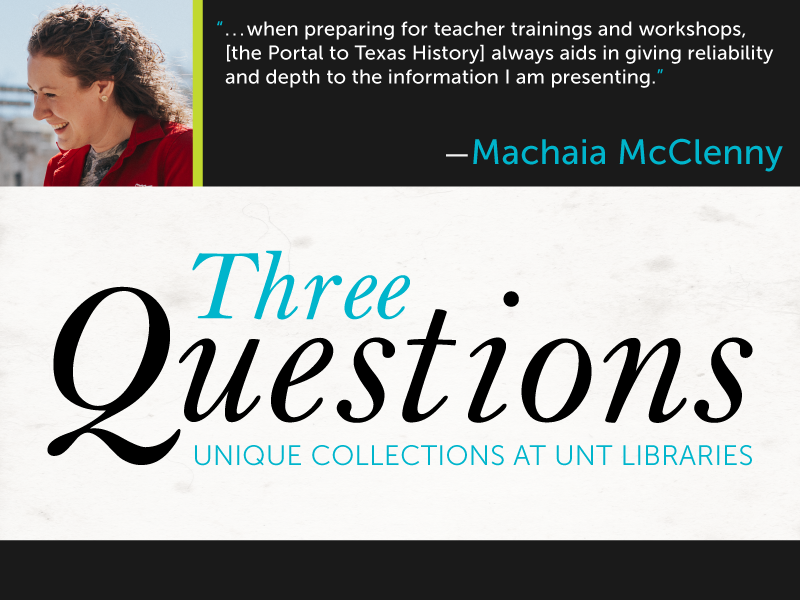
Three Questions with Machaia McClenny
Machaia McClenny began her career as a teacher and librarian, and she now works as the Education Specialist at the Alamo. She holds a Master of Science degree in Library Science from the University of North Texas. Three Questions is an initiative to share the value that our faculty, students, and others in the UNT community derive from using The Portal to Texas History at UNT Libraries. How important are Unique Collections in your teaching, learning or research? As the Education Specialist at the Alamo, I’ve found the Portal to Texas History to be a resource I turn to on a regular basis. I have used it in research for materials in the classroom from biographies of Texas to a handbook regarding the material culture of Texas. Furthermore, when preparing for teacher trainings and workshops, it always aids in giving reliability and depth to the information I am presenting. Having this plethora of primary resources at my fingertips is an invaluable tool. How have Unique Collections changed the way you approach your research, teaching or learning? Rather than relying on secondary sources, the Portal allows me to access primary sources that bring more legitimacy to my research. The primary sources also take dusty names in a textbook and make them feel like real people who lived and breathed. For example, after reading that William Barrett Travis apologized in a newspaper after his attack on the Fort at Anahuac in 1835, I was able to go to the Portal and read his article myself. The article proved that instead of apologizing Travis “request[ed] a suspension of public opinion…until he can appear before the public with all the facts and circumstances attending the capture of that fort.” Reading his actual words made the history come alive with a greater appreciation for the richness of the story. What do you want others to know about your research, teaching or learning? The Portal to Texas History is a resource that should be used by all history teachers. Whenever I am asked by teachers to recommend sources for Texas history, the Portal is always on the list. The almost 1,000,000 items in the collection serve as the initial draw, but the practicality of the site itself keeps you coming back. All of the search features allow me to find exactly what I need with ease. I particularly like the feature that allows you to narrow your search by decade. It is useful, well-designed, and absolutely free. Machaia McClenny began her career as a teacher and librarian, and she now works as the Education Specialist at the Alamo. She holds a Master of Science degree in Library Science from the University of North Texas. external_relations_in_the_news_three_questions
Posted:
11/30/2017
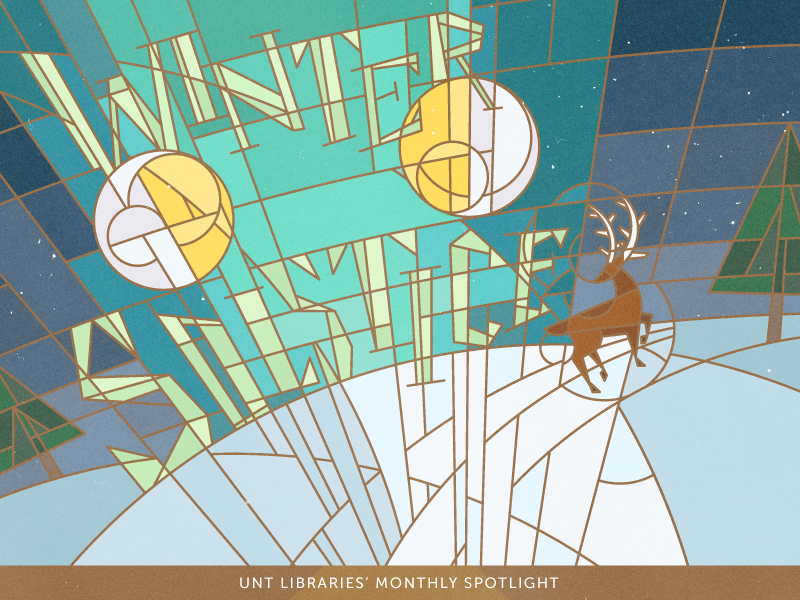
Monthly Spotlight: The Winter Solstice
The winter solstice is right around the corner! The winter solstice is right around the corner! No, we had no idea what that meant either when we heard about it. We vaguely remembered it had something to do with a really long night. Besides that? Nothing. So we set out to do some research and stumbled upon some interesting books and media in our very own UNT Libraries that you might be interested in. Oh, and when it actually happens this month. That seems important. But first, let’s answer a simple question: What on Earth is the winter solstice? It’s all about Earth, actually It’s the one moment, every year when the Northern Hemisphere (hey, that’s us!) is tilted furthest away from the sun. Here’s how The Telegraph explains it: The winter solstice happens every year when the Sun reaches its most southerly declination of -23.5 degrees. In other words, when the North Pole is tilted farthest – 23.5 degrees – away from the Sun, delivering the fewest hours of sunlight of the year. The Sun is directly overhead of the Tropic of Capricorn in the Southern Hemisphere during the December solstice and is closer to the horizon than at any other time in the year, meaning shorter days and longer nights. The winter solstice occurs around noon, at the exact moment that the sun rests over the Tropic of Capricorn, creating beautiful moments like the one in this photo. In other words, you’ll know it’s happening when you see it. For us, the December solstice will occur at 10:28 a.m. on Thursday, December 21. So those are the facts. But what a rabbit hole we fell into as we looked those up. Turns out, the world’s cultures have celebrated this annual astronomical event for centuries in many different ways. We’re talking festivals. We’re talking large rocks. We’re talking circles of large rocks sitting in the middle of nowhere. Here’s just a handful of topics we found interesting and the resources on them available to you, dear students, in the UNT Libraries. Stonehenge and Newgrange Solstice][]][] The renowned ring of standing stones in Wiltshire, England, has fascinated archaeologists and tourists for centuries. We still don’t know who built Stonehenge almost 5,000 years ago, but we might know why: to celebrate the winter and summer solstices. Per StonehengeTours.com: Stonehenge is carefully aligned on a sight-line that points to the winter solstice sunset (opposed to New Grange, which points to the winter solstice sunrise, and the Goseck circle, which is aligned to both the sunset and sunrise). It is thought that the winter solstice was actually more important to the people who constructed Stonehenge than the summer solstice. The winter solstice was a time when most cattle were slaughtered (so they would not have to be fed during the winter) and the majority of wine and beer was finally fermented. Your UNT Media Library has plenty of media exploring the origins of Stonehenge, including: Stonehenge: Secrets of an Ancient Monument NOVA: Secrets of Stonehenge Stonehenge: A New Understanding Stonehenge is obviously the more well-known of the two, but Newgrange is just as significant. The structure in Ireland is actually older than Stonehenge and marks the sunrise. You can read up on this lesser-known, but equally fascinating, place by checking out Robert Hensey’s book, First Light: The Origins of Newgrange in the UNT Libraries today. Machu Picchu Machu Picchu, the iconic ruins high in the Andes mountain range of Peru, was once the estate of an Incan emperor. It also holds a ritual stone known as Intihuatana important to the solstice. Intihuatana is aligned with the sun during the winter solstice; the word “intihuatana” is Quechua for “place to which the sun is chained.” During the winter solstice sunrise, sunlight beams through the Intihuatana, creating a triangle of light that illuminates two concentric circles on the stone floor behind it. At least one of the items in the UNT Libraries argues that this stone represents the intent of Machu Picchu as a whole. Besides that, there are plenty of items on the topic and the historic site itself available. Festivals Ah, yes. Finally. The parties! From China to Europe to South America, cultures throughout the world consider the solstice an important moment in their calendar years. Myths, stories, and celebrations have evolved around this annual moment for ages. In Celebrate the Solstice, Richard Heinberg recounts many of these. It’s available right now, just in time for your winter parties. in_the_news
Posted:
11/29/2017
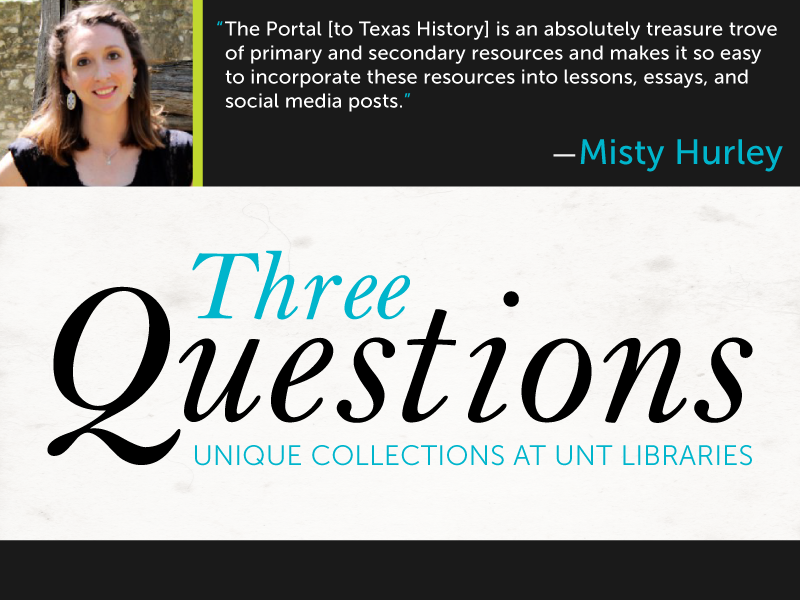
Three Questions with Misty Hurley
Misty Hurley holds a Bachelor’s in History from Sam Houston State University and a Master’s in Public History from Stephen F. Austin State University. Misty started her career at the Alamo as a Tour Guide and later became the Education Program Assistant, where she worked with students, coordinated field trips, and planned and oversaw summer camp. She recently became the Alamo’s Social Media Coordinator and hopes to continue sharing great information and resources with their adult audiences. Three Questions is an initiative to share the value that our faculty, students, and others in the UNT community derive from using The Portal to Texas History at UNT Libraries. How important are Unique Collections in your teaching, learning or research? In my position as the Education Program Assistant, I was able to use the Portal in a variety of ways. One of the ways that I was able to use the Portal is in the creation of lesson ideas and worksheets that encourage students to study and learn from primary and secondary sources, as is suggested in the TEKS. This year’s Camp Alamo: Gone to Texas, was another opportunity that I had to use the Portal to share information as we learned about the cultures that came to and influenced Texas. In my current position as Social Media Coordinator, I use the Portal to research individuals, events, and topics that we share on social media in order to educate our adult audience. How have Unique Collections changed the way you approach your research, teaching or learning? The Portal is an absolutely treasure trove of primary and secondary resources and makes it so easy to incorporate these resources into lessons, essays, and social media posts. We have to compete for our audience’s attention, so we need something to catch their eye and attract their interest, and what better way to do so with a map or photograph from that time period? What do you want others to know about your research, teaching or learning? There are a lot of unknowns, legends, and conflicting stories about the Alamo- even in primary and secondary sources, so it’s great to be able to use multiple sources to show these differing perspectives. The Portal makes it so easy to search a broad range of sources or narrow the search down to exactly what I’m looking for. Misty Hurley holds a Bachelor’s in History from Sam Houston State University and a Master’s in Public History from Stephen F. Austin State University. Misty started her career at the Alamo as a Tour Guide and later became the Education Program Assistant, where she worked with students, coordinated field trips, and planned and oversaw summer camp. She recently became the Alamo’s Social Media Coordinator and hopes to continue sharing great information and resources with their adult audiences. external_relations_in_the_news_three_questions
Posted:
11/17/2017
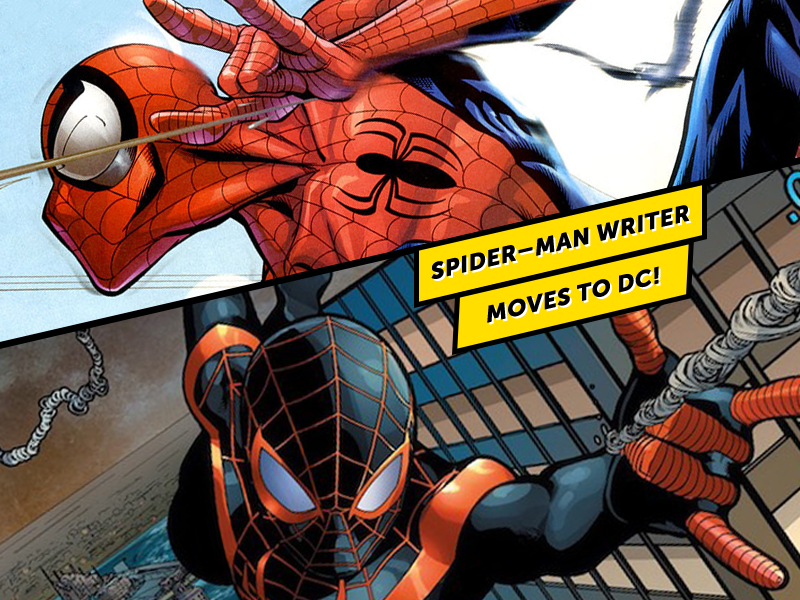
Acclaimed Spider-Man, Marvel Comics writer moves on to DC Comics
One of the major influencers of the Marvel universe upped and left for DC Comics recently, and we have a collection of his finest superhero stories available for you to check out now! Judging from the box office returns (over $879.9 million and counting), you probably saw Spider-Man Homecoming this fall. And loved it. One of the major influencers of that film—and the Marvel universe as a whole—made huge news this week. Brian Michael Bendis, the long-time Marvel Comics writer, upped and left for DC Comics on Tuesday, November 7. He was the writing force behind the fantastic Ultimate Spider-Man comic series in the early 2000s, which played a big role in Homecoming’s story. Bendis also wrote critically-adored stories for The Avengers, Jessica Jones, and Daredevil. So, yeah. He was big news, and his departure to DC is even bigger news in the comics world. Luckily for you, UNT Libraries has some of his most notable works available to check out. We also have the spectacular Spider-Man films available through our media library. (We won’t judge you for not checking out Spider-Man 3, though. We’re all trying to forget.) House of M (2006) This eight-issue series follow-up to the Planet X and Avengers Disassembled storylines pits the Avengers and X-Men against the Scarlet Witch in a reality-bending adventure. Bendis promised at the time the series would leave a lasting impact, and it did; the events of House of M had major ramifications for the Marvel comics universe. Secret War (2006) Wolverine, Spider-Man, Captain America, Daredevil and Luke Cage team up in this conspiracy thriller series, inspired by a conversation Bendis once had with a United States intelligence officer. Secret War kicked off a nearly decade-long run of Marvel crossover events. Secret Invasion (2008) Bendis paid off years of storytelling with this major Marvel crossover series that featured the invasion of Earth by the shape-shifting alien Skrulls. By the way, Skrulls will be the antagonists of the upcoming Captain Marvel film by Marvel Studios, so [you should pick this up as required background reading][Secret Invasion] before that film drops. Civil War II(2016) Bendis’ final major series for Marvel was this expansive, dramatic and consequential follow-up to Mark Millar’s iconic Civil War storyline from 2005. Captain Marvel and Iron Man lead two teams of superheroes against each other in a storyline that features numerous shocking twists and the ends of some of Marvel’s most iconic heroes. in_the_news
Posted:
11/10/2017
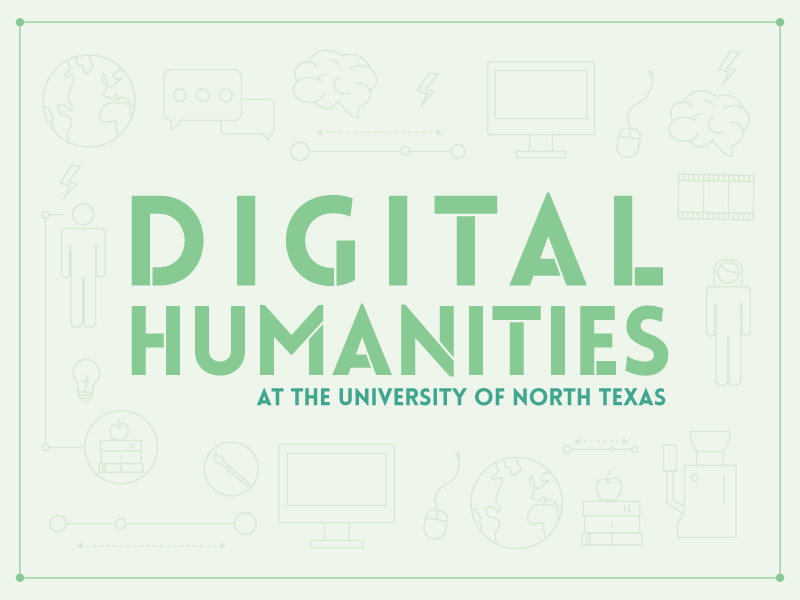
Lora Tompkins named HASTAC Scholar
We are delighted to announce that UNT graduate student Lora Tompkins has been accepted to the Humanities, Arts, Sciences, and Technology Alliance and Collaboratory (HASTAC) Scholars Program. Lora is the first graduate student from UNT to be part of this international program. [][] We are delighted to announce that UNT graduate student Lora Tompkins has been accepted to the [Humanities, Arts, Sciences, and Technology Alliance and Collaboratory (HASTAC) Scholars Program][]. Lora is the first graduate student from UNT to be part of this international program. The HASTAC Scholars fellowship program is an innovative student-driven community of graduate and undergraduate students. More than 800 HASTAC Scholars in dozens of disciplines have been sponsored by 145 colleges and universities–ranging from small liberal arts colleges to large Research 1 institutions. Lora Tompkins is the Graduate Assistant for [Digital Humanities with the Digital Humanities and Collaborative Programs Unit][] in the Public Services Division of the UNT Libraries. She is pursuing Master’s degrees in Library & Information Science, and History at UNT. As a person with cerebral palsy, Lora advocates for accessibility and accommodations for those with disabilities. She works to help educate people about the life of a disabled person, and can be seen around campus with Loki, her standard (large) Black Poodle service dog. During her fellowship, Lora will develop a content aggregation site of canine training and behavior videos, with emphasis on the service dog community and their needs. The hope is that the site will serve as a common platform for trainers and service dog teams, to discuss training and behaviors when distance prevents physical interaction. Lora’s fellowship will be supervised by Dr. Spencer Keralis, Research Associate Professor in the UNT Libraries. We are excited to bring UNT into the HASTAC community by sponsoring this fellowship, and look forward to seeing what Lora makes of the connections this community affords her. []: http://www.hastac.org/initiatives/hastac-scholars [Humanities, Arts, Sciences, and Technology Alliance and Collaboratory (HASTAC) Scholars Program]: https://www.hastac.org/initiatives/hastac-scholars [Digital Humanities with the Digital Humanities and Collaborative Programs Unit]: /public-services/ public_services_honors_and_awards
Posted:
11/08/2017
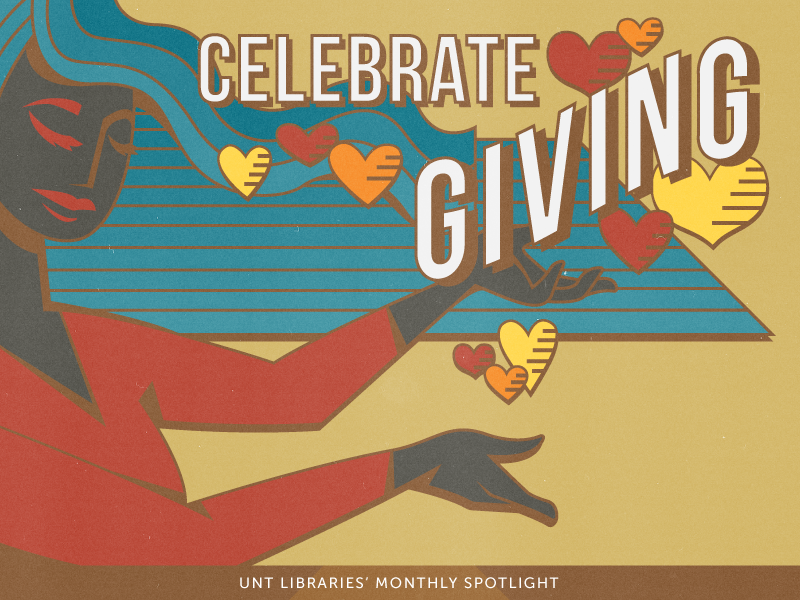
Monthly Spotlight: November of Giving
The calendar has flipped to November, ushering in cold weather and a greater need for generosity from students and Dentonites. For those in need, UNT Libraries is just one of numerous local outlets joining in the spirit of giving this month. The calendar has flipped to November, ushering in cold weather and a greater need for generosity from students and Dentonites. For those in need, UNT Libraries is just one of numerous local outlets joining in the spirit of giving this month. Whether you have overdue books and canned goods to exchange or some free time in between studying for finals, here’s a few ways you can help give back to locals in need this Thanksgiving holiday. Food for Fines - UNT Libraries That’s right. Your favorite penalty-forgiving goodwill drive is back! You can bring in canned goods to reduce your library fines while helping keep the Denton community well-fed at the same time. Don’t forget the important details (such as which goods are acceptable and how much we’ll shave off your fines) before you bring your donations to the Willis Library Services Desk. Food for Fines runs from November 6 to December 1. UNT Food Pantry In addition to partnering with our Food for Fines initiative, the food pantry is available for use and open for donations year-round. This time of the year is especially important for our friends at the pantry, so head on over to the pantry website to find out how to donate. Denton Nonprofit Events It’s a busy month for Denton-area nonprofits, with plenty of opportunities for you to spend your free time aiding the community. The annual Turkey Trot will need volunteers to help the race get underway, so sign up if you think you’re more of a helper and not a runner. The race is hosted by the Denton Area Running Club and benefits the Denton Community Food Center. Volunteers will be needed on November 22 and November 23. Denton County Friends of the Family is putting together 600(!!!) meals this month to victims of domestic violence and sexual assault in their annual Thanksgiving Meal Drive. Learn how to join the effort and become one of hundreds of giving souls this Thanksgiving. Giving Tuesday After we follow Thanksgiving with the mega shopping days of Black Friday and Cyber Monday, it’s time to give back a little. Luckily, #GivingTuesday is now a thing. Taking place on the first Tuesday after Thanksgiving, #GivingTuesday ushers in the season of charitable giving across the United States. [According to the #GivingTuesday website][], “#GivingTuesday has become a movement that celebrates and supports giving and philanthropy with events throughout the year and a growing catalog of resources.” Multiple Denton-area organizations are partners with the #GivingTuesday cause, including the Delta Public Service Foundation, Hearts for Homes, Texas Coalition for Animal Protection, and Meals on Wheels. in_the_news
Posted:
11/08/2017
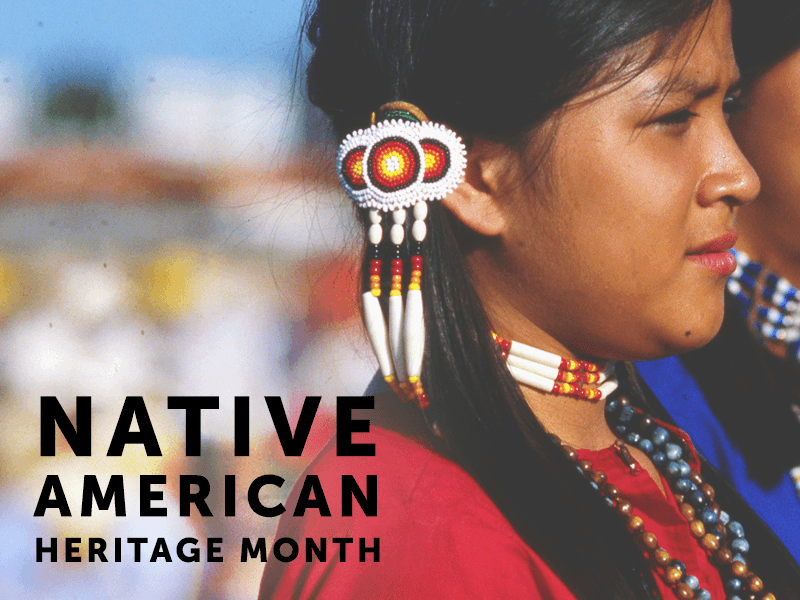
Native American Heritage Month
Join in paying tribute to the rich ancestry and traditions of Native Americans during Native American Heritage Month. November is Native American Heritage Month, or as it is commonly referred to, American Indian and Alaska Native Heritage Month. The month is a time to celebrate rich and diverse cultures, traditions, and histories and to acknowledge the important contributions of Native people. Resources: Native American Heritage Month list of books to checkout or share Native American Heritage Month subject list for browsing in our collections Native American Studies subject guide maintained by Subject Librarian Robbie Sittel The Portal to Texas History items Upcoming Event: Fem Flicks screening of Two Spirits Wednesday, November 15, 2017 - 4:00 p.m., Chilton Media Library, Room 111C. The Fem Flicks Film Series is a joint effort of the UNT Women’s Studies Program, the UNT Multicultural Center and the UNT Media Library. public_services_in_the_news
Posted:
11/03/2017

Native American Heritage Month
Join in paying tribute to the rich ancestry and traditions of Native Americans during Native American Heritage Month. November is Native American Heritage Month, or as it is commonly referred to, American Indian and Alaska Native Heritage Month. The month is a time to celebrate rich and diverse cultures, traditions, and histories and to acknowledge the important contributions of Native people. Resources: Native American Heritage Month list of books to checkout or share Native American Heritage Month subject list for browsing in our collections Native American Studies subject guide maintained by Subject Librarian Robbie Sittel The Portal to Texas History items Upcoming Event: Fem Flicks screening of Two Spirits Wednesday, November 15, 2017 - 4:00 p.m., Chilton Media Library, Room 111C. The Fem Flicks Film Series is a joint effort of the UNT Women’s Studies Program, the UNT Multicultural Center and the UNT Media Library. public_services_in_the_news
Posted:
11/03/2017
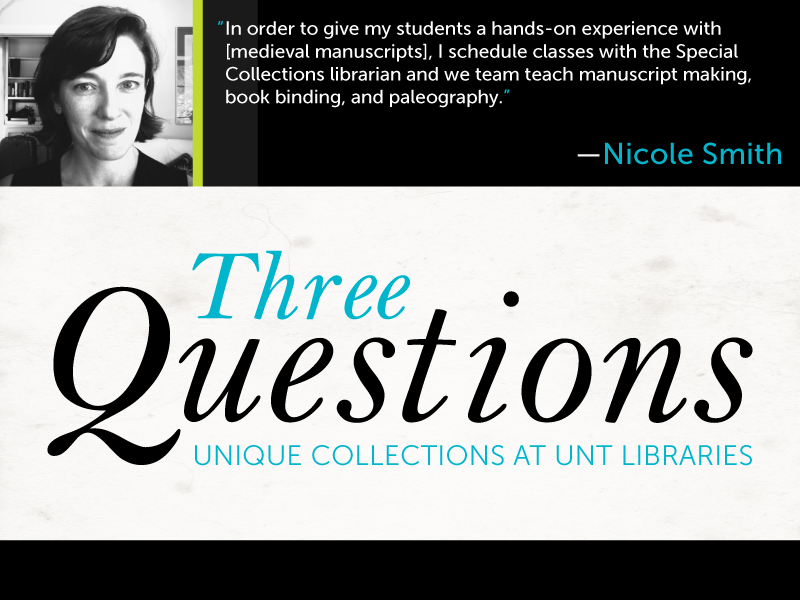
Three Questions with Nicole Smith
A native New Yorker, Dr. Nicole Smith is University Teaching Professor and Associate Professor of English at UNT. Inside the classroom, she is inspired by smart students and strange texts. Outside the classroom, she enjoys dancing, practicing handstands, and spending time with her son and daughter. Three Questions is an initiative to share the value that our faculty, students, and others in the UNT community derive from using The Portal to Texas History at UNT Libraries. How important are Unique Collections in your teaching, learning or research? As a researcher and teacher of medieval English literature with interests in textual studies and book making, I regularly integrate Unique Collections into my undergraduate and graduate classes. In the Middle Ages, reading texts meant interacting with manuscripts: books crafted with parchment (treated animal skin), written with hand made inks, and decorated with gold and precious minerals. In order to give my students a hands-on experience with such artifacts, I schedule classes with the Special Collections librarian and we team teach manuscript making, book binding, and paleography. Students examine and handle individual leaves and entire facsimiles of these artifacts. By using Unique Collections, my students become knowledgeable about textual studies and the history of the book. As a result, they acquire a different perspective on medieval texts that includes their compilation, circulation, and consumption by a reading public. How have Unique Collections changed the way you approach your research, teaching or learning? Because of the manuscript leaves and facsimiles, rare books, and early printing tools that are available for student use in Unique Collections, I have been able to schedule several classes in the Rare Books room for undergraduate and graduate students taking courses in medieval English literature or textual studies. These classes allow us to explore the artifacts with our hands and eyes so that we can experience the colors of the illuminations, the weight of the manuscript, and the smell of the animal skin. Students learn the intricacies of paleography and printing, and they begin to see that the making of a literary text is far more than just composing words on a page. What do you want others to know about your research, teaching or learning? My area of expertise is late medieval English literature with particular interest in Geoffrey Chaucer, women’s literature, and guides to pastoral care. Currently, my research focuses on a fourteenth-century Middle English explanation of the Apostles’ Creed that was written for and read by women aristocrats and nuns. This work, called A Christian Mannes Bileeve, exists in only four manuscripts, and I am preparing a critical edition of the text that will be published by Middle English Texts (Heidelberg: Universitätsverlag Winter). A native New Yorker, Dr. Nicole Smith is University Teaching Professor and Associate Professor of English at UNT. Inside the classroom, she is inspired by smart students and strange texts. Outside the classroom, she enjoys dancing, practicing handstands, and spending time with her son and daughter. external_relations_in_the_news_three_questions
Posted:
11/01/2017
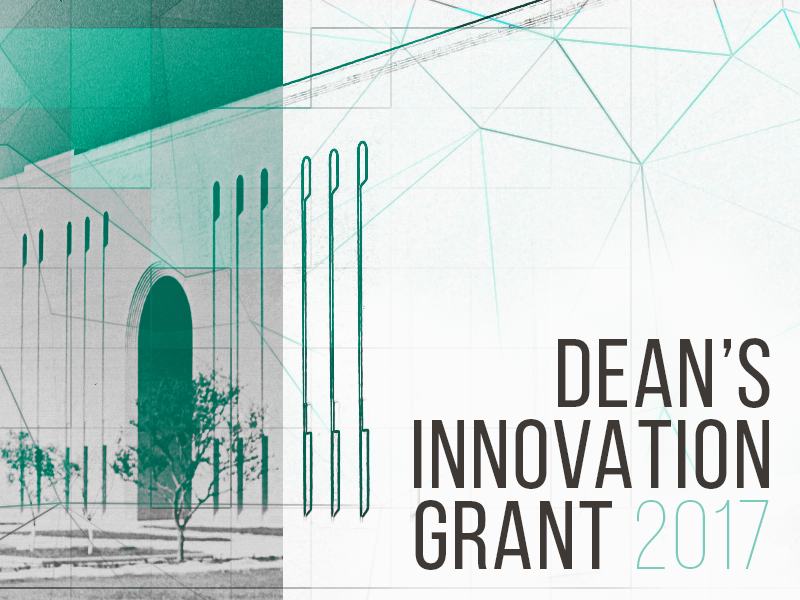
Dean's Innovation Grant 2017 Awardees
The University of North Texas Libraries’ Dean’s Innovation Grant, formerly known as the Green Light To Greatness Award, provides funding to research and projects within the UNT Libraries that promote scholarship and contribute to the gathering of knowledge that helps improve our libraries, our university, and the community. administrative_office_in_the_news_honors_and_awards_grant_award_dean_s_innovation_grant
Posted:
09/27/2017

Help Yourself
We are excited to announce the debut of the University Libraries’ Help Yourself campaign. This initiative strives to connect UNT students with library resources on topics that may be difficult and stressful for individuals to learn about or discuss openly due to contextual factors in their lives. We are excited to announce the debut of the University Libraries’ Help Yourself campaign. This initiative strives to connect UNT students with library resources on topics that may be difficult and stressful for individuals to learn about or discuss openly due to contextual factors in their lives. To empower students in their journey toward seeking knowledge and wellness, we compiled call numbers and campus resource information on three topics: Sexual Assault and Intimate Partner Violence, Gender Identity and Sexual Orientation, and Mental Health and Wellness. We will release these materials in a phased launch this Fall semester, beginning with Sexual Assault and Intimate Partner Violence in September. These resources will empower students to locate and check out these resources from the library in addition to seeking help from student-serving offices on campus. We will distribute these materials to any student-serving office on campus where students may benefit the most from finding this information. Student-serving campus organizations may request copies of the flyers (8.5 x 11”) or cards (3.5 x 8.5”) for your office by emailing digitalhumanities@unt.edu. We appreciate your help in spreading awareness of our resources to the broader UNT community. If you have questions about the Help Yourself Campaign or ideas for additional topics, please do not hesitate to contact us. public_services_about_the_libraries_resource_highlight_new_service
Posted:
09/11/2017

Dean's Innovation Grant 2017: The Portal to Texas History User Guide Video
The completely redesigned user interface of The Portal to Texas History has encouraged historians, genealogists, and everyday users to research their individual areas of interests. Internal user testing continues to uncover insights on how users interact with the Portal’s vast catalog of public records, historical documents and artifacts. The University of North Texas Libraries’ Dean’s Innovation Grant, formerly known as the Green Light To Greatness Award, provides funding to research and projects within the UNT Libraries that promote scholarship and contribute to the gathering of knowledge that helps improve our libraries, our university, and the community. Dean’s Innovation Grant 2017 Awardees Jake Mangum, Josh Sylve, Samantha Lawrence, Jeffrey Merrill Project Title The Portal to Texas History User Guide Video Project Description The completely redesigned user interface of The Portal to Texas History has encouraged historians, genealogists, and everyday users to research their individual areas of interests. Internal user testing continues to uncover insights on how users interact with the Portal’s vast catalog of public records, historical documents and artifacts. In order to create awareness with the public of all of the potential uses of the Portal in the areas of research, instruction, and casual discovery, the Library’s External Relations division would like to produce a high-end video to showcase the breadth of the Portal and its newest features. administrative_office_in_the_news_honors_and_awards_dean_s_innovation_grant
Posted:
09/05/2017

Dean's Innovation Grant 2017: It's in the Bag: Creating Sustainability in the Faculty Book Delivery Service
Supporting sustainable practices is an important goal of the university as outlined in its mission statement and strategic planning. As our Faculty Delivery Service responds to greater demand, we are becoming more aware of the environmental impact our delivery materials (plastic poly mailers) have because they are neither recyclable nor reusable. Faculty members have expressed concerns about the long-tenn use of these materials, and some have opted out of using the service as a result. The University of North Texas Libraries’ Dean’s Innovation Grant, formerly known as the Green Light To Greatness Award, provides funding to research and projects within the UNT Libraries that promote scholarship and contribute to the gathering of knowledge that helps improve our libraries, our university, and the community. Dean’s Innovation Grant 2017 Awardees Chris Cunningham, Rebecca Brand, Emily Cornell Project Title It’s in the Bag: Creating Sustainability in the Faculty Book Delivery Service Project Description Supporting sustainable practices is an important goal of the university as outlined in its mission statement and strategic planning. As our Faculty Delivery Service responds to greater demand, we are becoming more aware of the environmental impact our delivery materials (plastic poly mailers) have because they are neither recyclable nor reusable. Faculty members have expressed concerns about the long-term use of these materials, and some have opted out of using the service as a result. This application is being submitted to request funding to purchase reusable courier bags and to study and develop best practices for library delivery services. administrative_office_in_the_news_honors_and_awards_dean_s_innovation_grant
Posted:
09/05/2017

Dean's Innovation Grant 2017: Call and Response: Engaging with African American Male Students Through Culturally Relevant Music Resources
African American male students have the highest attrition rate. In Fall 2017, a new living/learning community comprised of freshmen males will meet for a one-hour course focused on the African American experience in the United States examined through the lens of African American music. The University of North Texas Libraries’ Dean’s Innovation Grant, formerly known as the Green Light To Greatness Award, provides funding to research and projects within the UNT Libraries that promote scholarship and contribute to the gathering of knowledge that helps improve our libraries, our university, and the community. Dean’s Innovation Grant 2017 Awardees Sara Outhier, David Huff, Lilly Ramin, Susan Smith, Harold Woodard, Candi Harris Project Title Call and Response: Engaging with African American Male Students Through Culturally Relevant Music Resources Project Description African American male students have the highest attrition rate. In Fall 2017, a new living/learning community comprised of freshmen males will meet for a one-hour course focused on the African American experience in the United States examined through the lens of African American music. This demonstration project seeks to discover how librarians can work with faculty, students, and support services to support culturally relevant projects and assignments. Through working with this cohort of African American male students, we will add culturally relevant resources that will show students and others that the library can directly support topics of interest to them. administrative_office_in_the_news_honors_and_awards_dean_s_innovation_grant
Posted:
09/05/2017

Dean's Innovation Grant 2017: Finding the Right Words: User-generated Description of Television News Collections
Growing expectation for digitized archival content means institutions must balance needs for access with quality metadata and embracing minimal description. For the NBC 5/KXAS television news collection, “minimal” description takes the form of keywords. Because employees have different areas of expertise and are not guided by a controlled vocabulary, description may reflect individual views of the material and its potential uses rather than metadata that is useful to other user groups. The University of North Texas Libraries’ Dean’s Innovation Grant, formerly known as the Green Light To Greatness Award, provides funding to research and projects within the UNT Libraries that promote scholarship and contribute to the gathering of knowledge that helps improve our libraries, our university, and the community. Dean’s Innovation Grant 2017 Awardees Laura Treat, Courtney Jacobs Project Title Finding the Right Words: User-generated Description of Television News Collections Project Description Growing expectation for digitized archival content means institutions must balance needs for access with quality metadata and embracing minimal description. For the NBC 5/KXAS television news collection, “minimal” description takes the form of keywords. Because employees have different areas of expertise and are not guided by a controlled vocabulary, description may reflect individual views of the material and its potential uses rather than metadata that is useful to other user groups. This project seeks to better understand and improve our processes by exploring how potential metadata creators and users create keywords for television news stories. administrative_office_in_the_news_honors_and_awards_dean_s_innovation_grant
Posted:
09/05/2017

Dean's Innovation Grant 2017: Escape the Library: Building a Better Library Literacy Escape Room
Escape to the Library: A Library Learning Escape Room Experience was a successful and popular option during First Flight in 2016 that incorporated learning objectives tied to the ACRL Framework into a fun, immersive puzzle-solving experience. The University of North Texas Libraries’ Dean’s Innovation Grant, formerly known as the Green Light To Greatness Award, provides funding to research and projects within the UNT Libraries that promote scholarship and contribute to the gathering of knowledge that helps improve our libraries, our university, and the community. Dean’s Innovation Grant 2017 Awardees Erin Miller, Diane Robson, Jeremy Kincaid Project Title Escape the Library: Building a Better Library Literacy Escape Room Project Description Escape to the Library: A Library Learning Escape Room Experience was a successful and popular option during First Flight in 2016 that incorporated learning objectives tied to the ACRL Framework into a fun, immersive puzzle-solving experience. Funding this grant will allow the 2017 Escape the Library to be more interactive and engaging. Building on the first successful implementation of this interactive learning experience, Escape the Library 2017 will incorporate new props and puzzles while maintaining a focus on introducing incoming freshmen to library resources, librarians and information-seeking skills. administrative_office_in_the_news_honors_and_awards_dean_s_innovation_grant
Posted:
09/05/2017
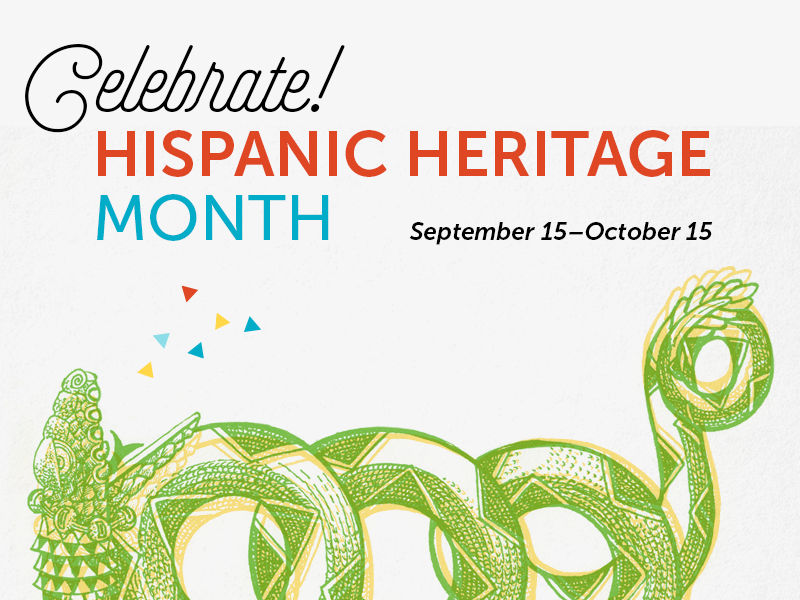
Hispanic Heritage Month - 2017
Hispanic Heritage Month is one of several “heritage months” that highlight cultures and contributions. Hispanic Heritage Month is one of several “heritage months” that highlight cultures and contributions. “During National Hispanic Heritage Month (September 15 to October 15) we recognize the contributions made and the important presence of Hispanic and Latino Americans to the United States and celebrate their heritage and culture.” (Source: https://www.hispanicheritagemonth.org) Many libraries participate in heritage month events. The National Hispanic Heritage Month Library of Congress page has collections and partners. The Programming Librarian’s page, from American Library Association, has ideas for learning more. Carnaval (UNT event) September 19, 2017 from 11:00 -1:00 UNT Union South Lawn ([@UNT_MCC Carnaval tweet][]) About: “Join the Multicultural Center and UPC as we celebrate Hispanic Heritage Month with free food, music, and dancing!” There will be a library table staffed by Sociology Librarian, Lilly, so feel free come say hi, and pick up some library goodies. Browse related subjects at UNT Libraries: The UNT Libraries has resources, such as print and electronic books, that relate to different areas of Hispanic Heritage. Examples of Subjects to browse are not limited, but include: Hispanic Americans — Literary collections | Hispanic Americans and Mass Media | Hispanic Americans – Ethnic identity | Hispanic Americans – Biography | Hispanic Americans — Poetry Check out our previous Hispanic Heritage Month Display list of books. Sample books are located on the Willis Library first-floor book drop available for check out: Lotería cards and fortune poems: a book of lives (PS3558.E74 L66 1999) Linocuts by Artemio Rodríguez; poems by Juan Felipe Herrera Six kinds of sky: a collection of short fiction (PS3571.R74 S59 2002) by Luis Alberto Urrea Red hot salsa: bilingual poems on being young and Latino in the United States (PS591.H58 R43 2005) Edited by Lori Marie Carlson; introduction by Oscar Hijuelos Hispanic/Latino identity: a philosophical perspective (E184.S75 G67 2000) by Jorge J.E. Gracia Latino chronology: chronologies of the American mosaic ((E184.S75 F543 2007) by D. H. Figueredo ¡Bravo!: poemas sobre hispanos extraordinarios (J920 E58br Spanish, Juvenile Collection) Margarita Engle; ilustrado por Rafael López (See also English version: Bravo!: poems about amazing Hispanics (J920 E58br) Anything you recommend that is not at UNT Libraries? Feel free to make a suggestion by filling out the New Purchase/Recommendation form. Please enjoy the display, and the festivities! collection_highlight
Posted:
08/31/2017
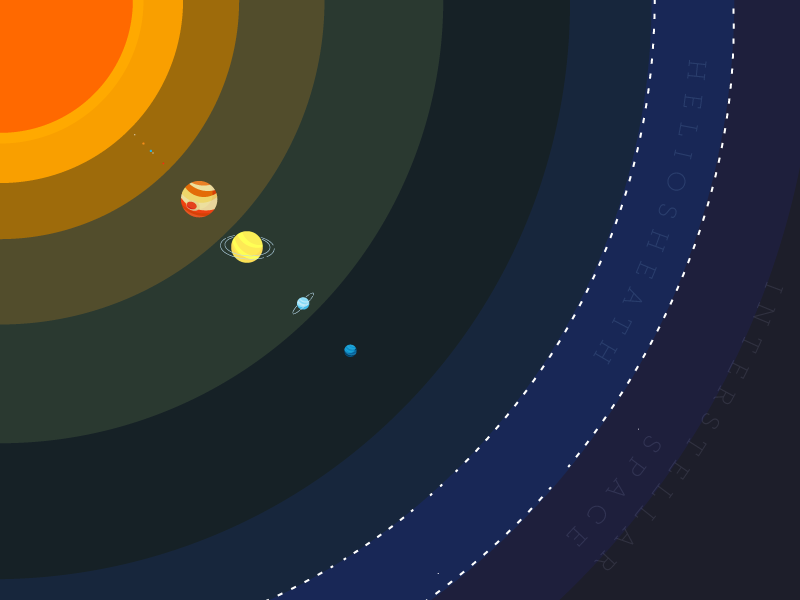
Celebrate 40 Years of Space Exploration
In 1972, NASA began a mission that would take advantage of a rare alignment of the planets that would make it possible to visit all four outer planets. In August and September of 1977, Voyager 1 and 2 were launched into space. In 1972, NASA began a mission that would take advantage of a rare alignment of the planets that would make it possible to visit all four outer planets. In August and September of 1977, Voyager 1 and 2 were launched into space. September 5, 2017 marks the 40th anniversary of the launch of Voyager 1, now the first man-made object in Interstellar Space. Its twin, Voyager 2 (launched August 22), currently traverses the Heliosheath. Since their launches in 1977, Voyager 1 and 2 have collected data from Jupiter, Saturn, Uranus, Neptune and the many moons that orbit the four planets. Included in the data are breath taking pictures and a family portrait of the planets in our solar system. Learn more about the Voyager spacecraft from NASA. Listen to the sounds of Interstellar Space. Voyager has taken thousands of pictures of space. View these and others in NASA’s Photojournal. Check out books about Voyager’s findings and space travel. Stream video created based on Voyager’s findings. Watch Voyager: Journey to the Stars for a summary of Voyager’s ongoing 40-year space expedition. user_interfaces_in_the_news
Posted:
08/31/2017

Dean's Innovation Grant 2017: Intersections of Scholarly Communication & Information Literacy Workshop
The proposed project involves hosting an ACRL licensed workshop on “Intersections of Scholarly Communication and Information Literacy” aimed at developing collaborations and learning experiences for students, faculty, and staff interested in improving competencies in these areas or integrating them into their teaching or research. The University of North Texas Libraries’ Dean’s Innovation Grant, formerly known as the Green Light To Greatness Award, provides funding to research and projects within the UNT Libraries that promote scholarship and contribute to the gathering of knowledge that helps improve our libraries, our university, and the community. Dean’s Innovation Grant 2017 Awardees John Martin, Greg Hardin, Lynette O’Keefe Project Title Intersections of Scholarly Communication & Information Literacy Workshop Project Description The proposed project involves hosting an ACRL licensed workshop on “Intersections of Scholarly Communication and Information Literacy” aimed at developing collaborations and learning experiences for students, faculty, and staff interested in improving competencies in these areas or integrating them into their teaching or research. The workshop would be the first step in a year-long effort to implement ideas generated during the workshop and to build further collaborations with campus partners. The requested funds will be used to pay for the workshop fee, travel & lodging for workshop facilitators, and to cover the costs of catering and materials for the event. administrative_office_in_the_news_honors_and_awards
Posted:
08/17/2017
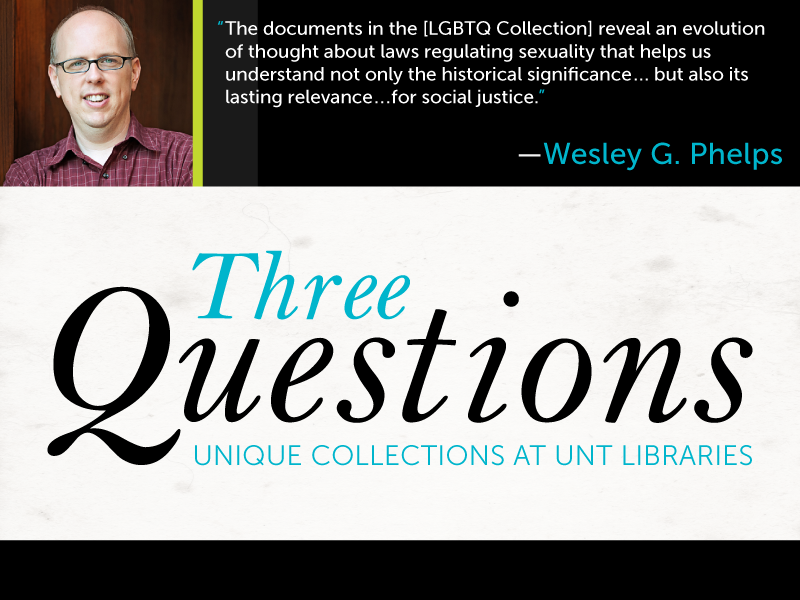
Three Questions with Wesley Phelps
Wesley G. Phelps received his B.A. and M.A. from the University of North Texas and his Ph.D. in history from Rice University. He is currently an assistant professor of history at Sam Houston State University in Huntsville, Texas, where he teaches courses on recent United States history, the American South, and LGBTQ history. His current research focuses on gay and lesbian political activism in the late twentieth century. Three Questions is an initiative to share the value that our faculty, students, and others in the UNT community derive from using The Portal to Texas History at UNT Libraries. How important are Unique Collections in your teaching, learning or research? The LGBTQ Collection at the University of North Texas is indispensable for my current book project on legal challenges to Texas sodomy laws between 1867 and 2003. From complete runs of dozens of local newspapers and newsletters to organizational records and correspondence, this collection enables me to chronicle how local activists and organizations developed a legal strategy in the mid and late twentieth century that eventually produced a victory in the Supreme Court decision Lawrence v. Texas, which invalidated all remaining state sodomy laws in 2003. The documents in this collection reveal an evolution of thought about laws regulating sexuality that helps us understand not only the historical significance of the legal battle, but also its lasting relevance to current struggles for social justice. How have Unique Collections changed the way you approach your research, teaching or learning? One of the ways the LGBTQ Collection changed my research project was by deepening my understanding of a case titled Baker v. Wade, which was the most important case challenging Texas’s “Homosexual Conduct” law prior to the Lawrence case. Before conducting research at the University of North Texas, I had constructed a broad outline of the Baker case and developed an analysis based on the official court documents that are available. It was not until I discovered Don Baker’s personal papers in the LGBTQ Collection, however, that I began to understand just how much Baker’s own history as an activist and his desire to use his experience as an exercise in public education influenced the development of the case. With the kinds of documents found in UNT’s Special Collections, I will be able to write a book that gives these early cases like Baker v. Wade the thorough analysis they deserve. What do you want others to know about your research, teaching or learning? I want others to know that the recent gains of the movement for gay and lesbian civil rights did not come out of nowhere. Many people I know, myself included, have marveled at how quickly marriage equality became a reality in 2015. Yet while we can rightly acknowledge the relative swiftness of that victory in light of where we were, say, between 2004 and 2006, we still must recognize that these advances have deep historical roots. I also think it is important to recognize that constitutional change comes from below – from the grassroots activists and organizations that push for change using the court system. In order to explain where change comes from, often we say things like “the time had simply come for a change” or “society developed to the point where this change was possible.” These cases, however, show us that, in fact, people fought and sacrificed for the political and legal changes we have seen over the past several decades. Finally, I want others to see that these cases reveal the importance of grassroots activism in a democracy. It was the local activism of people like Don Baker and the Texas Human Rights Foundation that produced these gains, and they did it through old-fashioned organizing, mobilizing, and agitating. Perhaps most important for the current state of our democracy, the stories of these cases suggest that it will also be grassroots activism that will protect these advances, not only the recent gains for queer Americans, but also women’s reproductive rights, civil rights for racial minorities, and even the social safety net that was built throughout the mid-twentieth century. It was grassroots activism that delivered those gains, and it will be grassroots activism that determines whether or not we keep them around. Wesley G. Phelps received his B.A. and M.A. from the University of North Texas and his Ph.D. in history from Rice University. He is currently an assistant professor of history at Sam Houston State University in Huntsville, Texas, where he teaches courses on recent United States history, the American South, and LGBTQ history. His first book, A People’s War on Poverty: Urban Politics and Grassroots Activists in Houston, was published by the University of Georgia Press in 2014. His current research focuses on gay and lesbian political activism in the late twentieth century. external_relations_in_the_news_three_questions
Posted:
08/02/2017
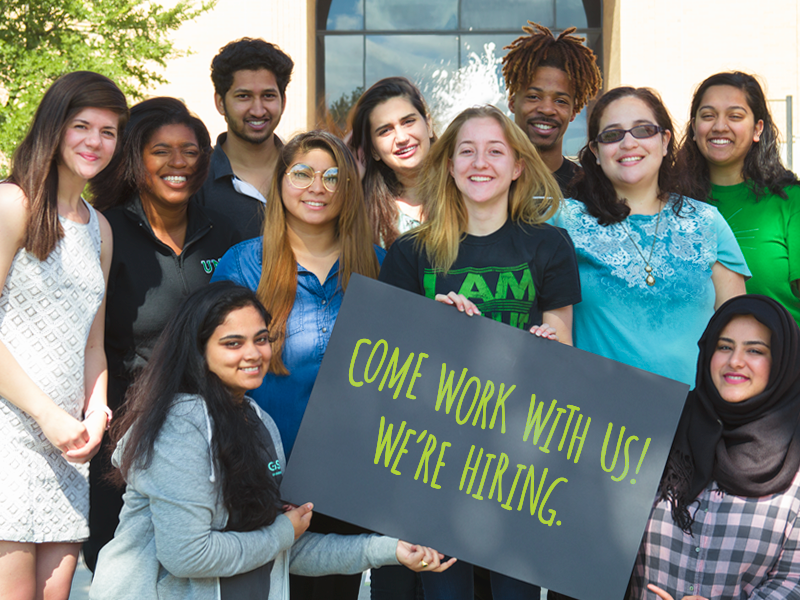
UNT Handshake Tips for Working in the Libraries
Are you looking for a job on campus? Do you want to gain work experience to develop your professional resume? Come work at the UNT Libraries! Welcome, UNT Students! Looking for a job on campus? Want to gain work experience to develop your professional resume? Come work at the library! We have many student assistant positions available on the Eagle Careers site. Working for the library is a great way to develop a variety of workplace skills and no previous library experience is required. You will apply through UNT Handshake and we’ve created a step-by-step guide to getting your application materials uploaded and seen by the library search committees. UNT Handshake tips What you’ll need: A computer and access to the internet Resume Student Employment Application to upload Copy of your class schedule Cover letter which addresses the job description Any other required documents or items as noted in the official job posting TIP: It is important to tailor your resume or cover letter to the position you are applying for. Check out the Career Center’s guides located on the right of this page. Let’s get started! Go to the UNT Handshake site. Click on Student Login to reach the UNT Handshake login page. Select Active UNT Students Login Here and sign in with your EUID and Password. Select Jobs at the top of the screen. Type Libraries in the search box and select the Part-Time and On-Campus filters. All jobs in the libraries should be visible now. Click on the job that appeals most to you. TIP: There is a regular and College Work Study posting for each position so please make sure to apply for the correct posting. Be sure to read the job description before choosing to apply! Select the green Apply button to the right of the application deadline. An Apply to University of North Texas - Student Employment window will pop up that will allow you to upload your application materials. We strongly recommend using the Upload New button to upload your customized materials that address your specific job description. TIP: Materials specifically tailored to address job advertisements and descriptions may help bump you to the top of the list. Once your materials have uploaded to the system, select Submit Application. And now you have completed applying through Handshake! Other Things To Note: Many job postings for library positions require you to provide additional application materials like work samples (i.e. writing samples, videos, and graphic design portfolios). These should be included with your emailed documents. Once you have applied in Handshake and sent a copy of all requested materials to the search committee, you will have completed the application process for your desired position! Congratulations! Go have some lunch or something. Search committees may notify you of your application status through handshake or email, so be sure to check both places often. in_the_news
Posted:
07/19/2017
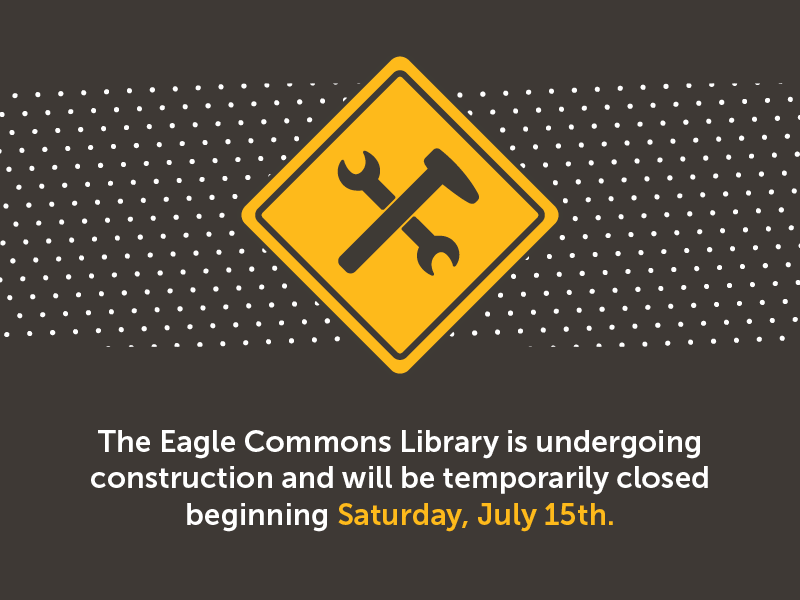
Temporary Closure of Eagle Commons Library
The Eagle Commons Library is undergoing construction and will be temporarily closed beginning Saturday, July 15th. We hope to reopen back to our regular hours on July 20th. For more information on hours & exceptions, please visit our page. Limited Course Reserve items will be available at the Willis Library Circulation desk during this closure. To find out if your Reserve item is available, please contact the Willis Library Circulation desk at 940-565-2413 or circ@unt.edu. If you have questions, please contact us at govinfo@unt.edu. public_services_in_the_news
Posted:
07/13/2017
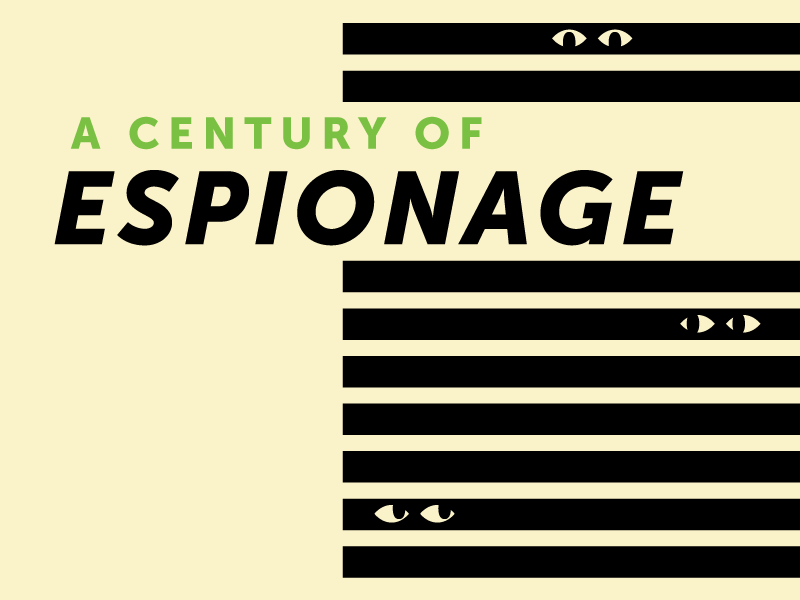
A Century of Espionage
Learn about the Espionage Act of 1917 and the history of spying in America with our resources. On June 15, 1917, President Woodrow Wilson signed the Espionage Act into federal law, initially as a way protect the United States from internal and external enemies during wartime. Since then, the Espionage Act of 1917 has been amended numerous times and used for different purposes. At the same time, the subject of espionage became a much buzzed-about topic in American culture, from Mad magazine’s Spy vs. Spy comic strip to the consistent stream of spy-related films coming out of Hollywood. You can learn more about espionage in the United States with UNT Libraries. Learn more about the Espionage Act of 1917 Watch Documents of Destiny: The World War I Years to learn about the historical context of the Espionage Act Read a book about the Espionage Act of 1917 and its implications in the UNT Library Catalog Explore the real-time effects of the Espionage Act through newspapers available on The Portal to Texas History Espionage in Popular Culture Read a book from UNT Libraries’ Monthly Books collection “Collusions of Conspiracy: Government Plots, Alien Abductions, and Opposing Viewpoints” Watch a spy-related movie from the UNT Media Library in_the_news
Posted:
06/23/2017
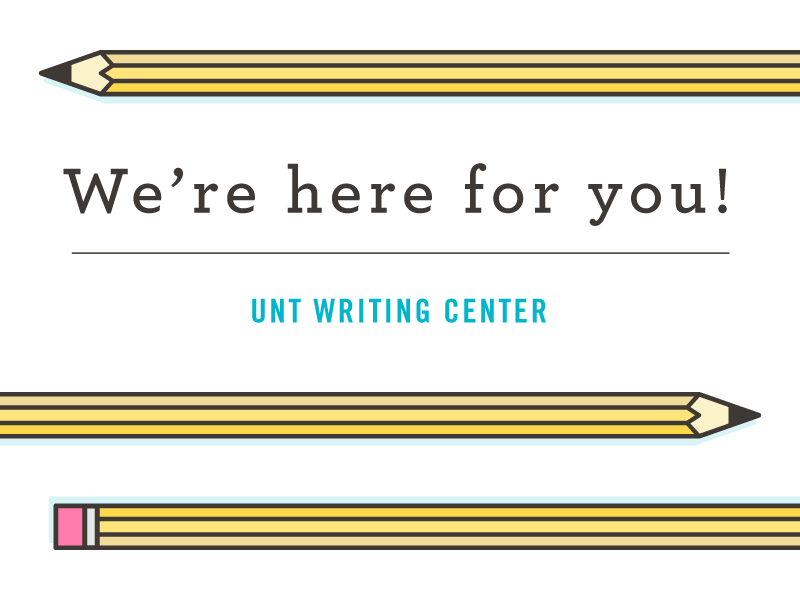
Summer Hours for Writing Tutors in Willis Library
Our libraries are helping students succeed at UNT by offering writing lab and subject specific tutoring this summer in Willis Library. This summer the writing tutors from the UNT Writing Lab will be back in Willis Library, Room 250C. Monday from 5:00 - 8:00 p.m. Wednesday from 5:00 - 8:00 p.m. You don’t need to make an appointment; this service is walk-in all summer long. We are really excited to be partnering with the UNT Writing Lab to provide you with as much help as we can when you come to Willis Library. public_services_in_the_news
Posted:
06/23/2017
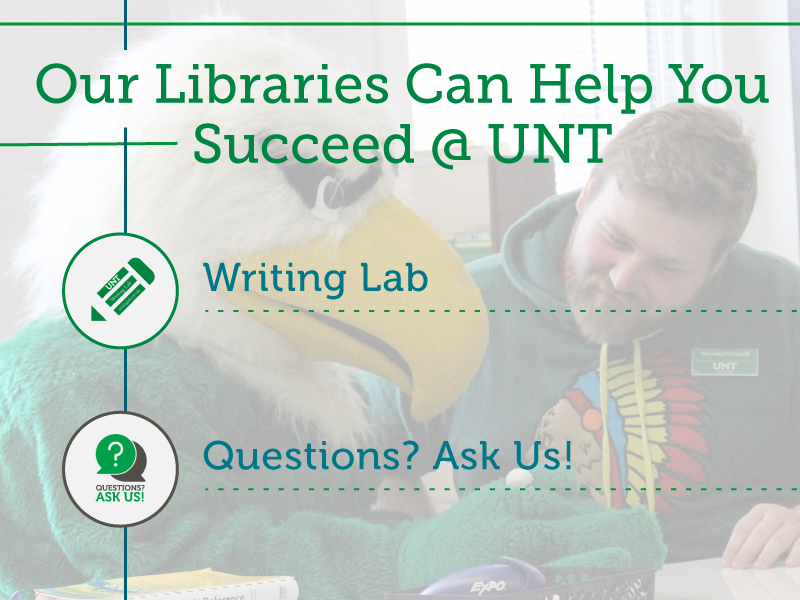
Summer Hours for Writing Tutors in Willis Library
Our libraries are helping students succeed at UNT by offering writing lab and subject specific tutoring this summer in Willis Library. This summer the writing tutors from the UNT Writing Lab will be back in Willis Library, Room 250C. Monday from 5:00 - 8:00 p.m. Wednesday from 5:00 - 8:00 p.m. You don’t need to make an appointment; this service is walk-in all summer long. We are really excited to be partnering with the UNT Writing Lab to provide you with as much help as we can when you come to Willis Library. public_services_in_the_news
Posted:
06/23/2017
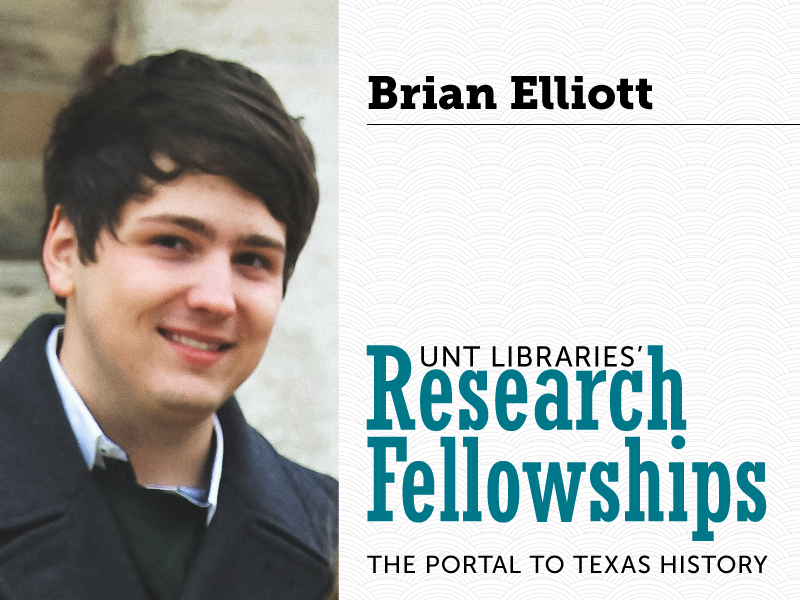
The Portal to Texas History 2017 Research Fellowship Awardee - Brian Elliott
Brian Elliot is a Ph.D. Student and Teaching Fellow with the History Department at the University of North Texas. Brian’s research focuses on slavery during the Civil War, and the legacy of former slaves as “Black Confederates.” Brian’s published materials include his Master’s thesis “Peculiar Pairings: Texas Confederates and their Black Body Servants,” as well as a number of published book reviews. Brian has presented his research at several conferences, including at the Society for Military History, and the Southwest Social Science Association, and has given informal talks on his research and the utility of digital resources in historical research. The University of North Texas Libraries invite applications for the 2017 The Portal to Texas History Research Fellowship. Research using the Portal is relevant to studies in a variety of disciplines including history, journalism, political science, geography, and American studies. We encourage applicants to think creatively about the opportunities that research with large digital library collections can enable. Preference will be given to applicants who demonstrate the greatest potential for publication and the best use of The Portal to Texas History. The Portal to Texas History 2017 Research Fellowship Awardee Brian Elliott Project Title Passing as Gray: Confederate Body Servants and their Legacy as Black Confederates Project Description Using various primary sources, my project looks to understand the relationship of Confederate soldiers and their body servants (slaves) during and after the Civil War. This project will ultimately help us to better understand these complex figures and post-Civil War conceptions of former slaves as “Black Confederates.” Biography Brian Elliott is a Ph.D. Student and Teaching Fellow with the History Department at the University of North Texas. Brian’s research focuses on slavery during the Civil War, and the legacy of former slaves as “Black Confederates.” Brian’s published materials include his Master’s thesis “Peculiar Pairings: Texas Confederates and their Black Body Servants,” as well as a number of published book reviews. Brian has presented his research at several conferences, including at the Society for Military History, and the Southwest Social Science Association, and has given informal talks on his research and the utility of digital resources in historical research. digital_libraries_in_the_news_honors_and_awards_research_fellowships
Posted:
06/22/2017
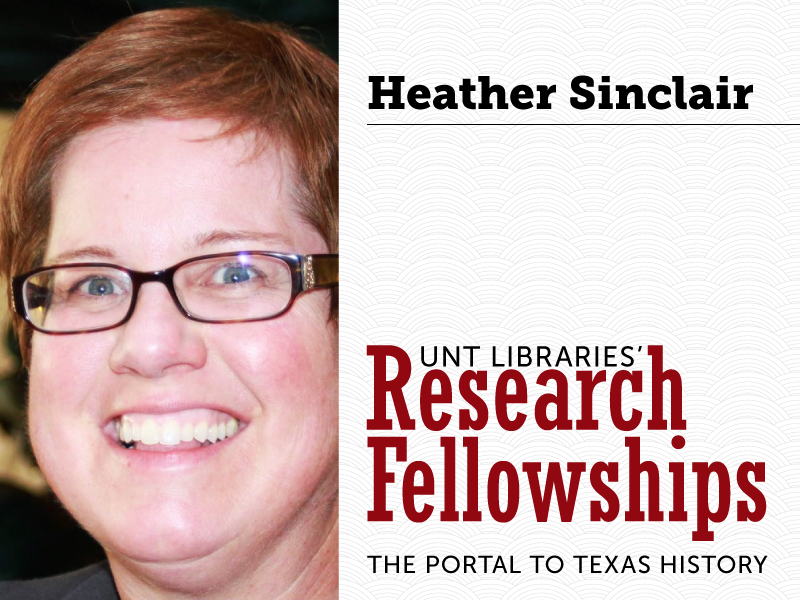
The Portal to Texas History 2017 Research Fellowship Awardee - Heather Sinclair
Heather Sinclair has a background in professional midwifery and activism and received her Ph.D. in history in 2016 from the University of Texas at El Paso. Her dissertation is entitled “Birth City: Race and Violence in the History of Childbirth and Midwifery in the El Paso-Ciudad Juárez Borderlands, 1907-2013.” She is currently a lecturer in history and women’s studies at the University of Texas at El Paso. She received a B.A. in history and certificate in women’s studies from Duke University. The University of North Texas Libraries invite applications for the 2017 The Portal to Texas History Research Fellowship. Research using the Portal is relevant to studies in a variety of disciplines including history, journalism, political science, geography, and American studies. We encourage applicants to think creatively about the opportunities that research with large digital library collections can enable. Preference will be given to applicants who demonstrate the greatest potential for publication and the best use of The Portal to Texas History. The Portal to Texas History 2017 Research Fellowship Awardee Heather Sinclair Project Title Birthing a History of Midwifery in the Twentieth-Century Texas-Mexico Borderlands Project Description This project will use the Portal to Texas History digital collections to explore midwifery, childbirth practices, and infant mortality primarily in early twentieth-century El Paso, Texas. Particular attention will be paid to childbearing and child rearing practices as sites of inclusion and exclusion along the lines of gender, race, class, and citizenship. I will use this research to convert my dissertation into a book manuscript and to publish an article in a peer-reviewed journal in history. Biography Heather Sinclair has a background in professional midwifery and activism and received her Ph.D. in history in 2016 from the University of Texas at El Paso. Her dissertation is entitled “Birth City: Race and Violence in the History of Childbirth and Midwifery in the El Paso-Ciudad Juárez Borderlands, 1907-2013.” She is currently a lecturer in history and women’s studies at the University of Texas at El Paso. She received a B.A. in history and certificate in women’s studies from Duke University. digital_libraries_in_the_news_honors_and_awards_research_fellowships
Posted:
06/22/2017
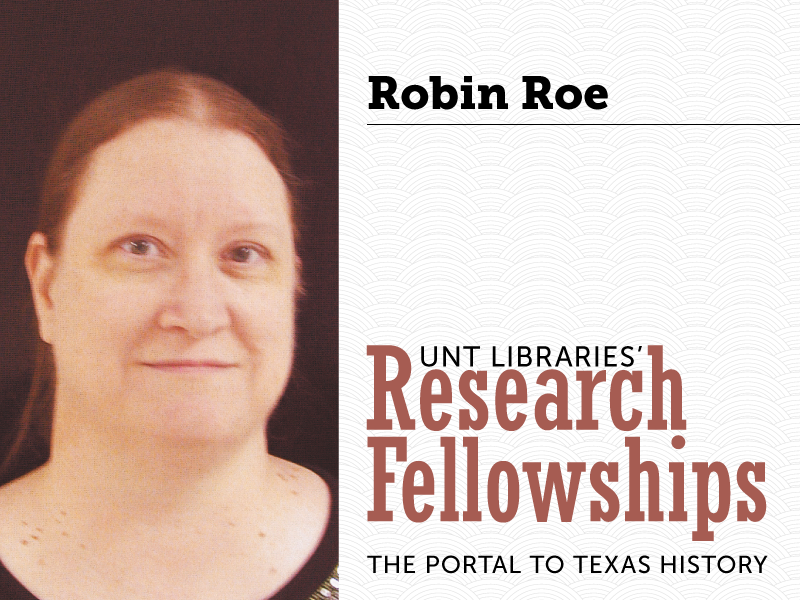
The Portal to Texas History 2017 Research Fellowship Awardee - Robin Roe
Robin Roe is a doctoral candidate at Texas A&M University and received her BA and MA in History from Texas A&M University. Her dissertation examines how media used weather-related natural disasters in Texas and the Southwest border region in the early Twentieth Century to manipulate public perceptions of race, ethnicity, immigration status, gender, and class, and how some of those victims contested that manipulation. She is a veteran of the U. S. Air Force and has worked as a copy editor and in the computer industry before beginning her graduate work. She is particularly interested in the potential of digital humanities for historical research. The University of North Texas Libraries invite applications for the 2017 The Portal to Texas History Research Fellowship. Research using the Portal is relevant to studies in a variety of disciplines including history, journalism, political science, geography, and American studies. We encourage applicants to think creatively about the opportunities that research with large digital library collections can enable. Preference will be given to applicants who demonstrate the greatest potential for publication and the best use of The Portal to Texas History. The Portal to Texas History 2017 Research Fellowship Awardee Robin L. Roe Project Title On the Borders of Disaster Project Description This portion of On the Borders of Disaster compares English-language newspaper reports about a major 1921 flood with Spanish-language newspaper reports of that flood to analyze how one group contested the dominant narrative that cast the victims as passive and helpless. What emerges are two very different accounts of the disaster, manipulated not by lies but by selective inclusion and omission. This article will become a crucial chapter of my dissertation. Biography Robin L. Roe is a doctoral candidate at Texas A&M University and received her BA and MA in History from Texas A&M University. Her dissertation examines how media used weather-related natural disasters in Texas and the Southwest border region in the early Twentieth Century to manipulate public perceptions of race, ethnicity, immigration status, gender, and class, and how some of those victims contested that manipulation. She is a veteran of the U. S. Air Force and has worked as a copy editor and in the computer industry before beginning her graduate work. She is particularly interested in the potential of digital humanities for historical research. digital_libraries_in_the_news_honors_and_awards_research_fellowships
Posted:
06/22/2017
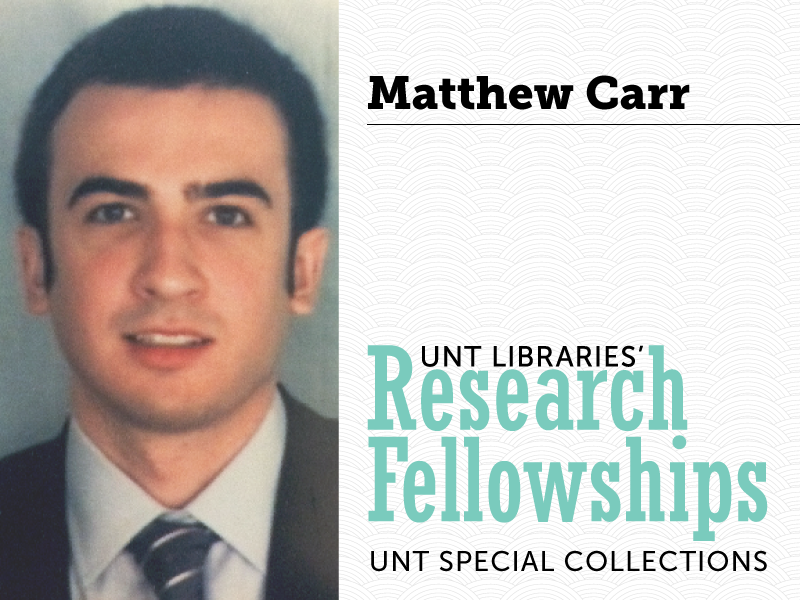
The UNT Special Collections 2017 Research Fellowship Awardee - Matthew Carr
Matthew Carr is a student in Columbia University’s political science Ph.D .program. His research focuses on American political institutions. He’s working on a project – which makes extensive use of archival resources – collecting state-level political party platforms from 1960 through the present day, in order to trace the evolution of party development. The University of North Texas Libraries invite applications for the 2017 UNT Special Collections Research Fellowship. Research in special collections is relevant to studies in a variety of disciplines including history, journalism, political science, geography, fine art, art history and American studies. We encourage applicants to think creatively about new uses for special collections. Preference will be given to applicants who demonstrate the greatest potential for publication and the best use of special collections at UNT Libraries. The UNT Special Collections 2017 Research Fellowship Awardee Matthew Carr Project Title Origins of the Culture War: Social Issues in State Party Platforms, 1960-2016 Project Description Beginning sometime in the late 20th century, social issues that previously had played little role in party division came to separate one party from the other. Republican and Democratic elites staked out opposing positions on a range of issues–including abortion, gay rights, the role of religion in the public sphere, and gun control–and party electorates today are sharply polarized over these issues. Drawing on a massive new dataset, we test the proposition that – by the time national parties and elites took positions on social issues – the parties were already constrained by state-level position-taking, and that the origins of social issues in the states came earlier than in national platforms. Biography Matthew Carr is a student in Columbia University’s political science Ph.D .program. His research focuses on American political institutions. He’s working on a project – which makes extensive use of archival resources – collecting state-level political party platforms from 1960 through the present day, in order to trace the evolution of party development. special_collections_in_the_news_honors_and_awards_research_fellowships
Posted:
06/16/2017
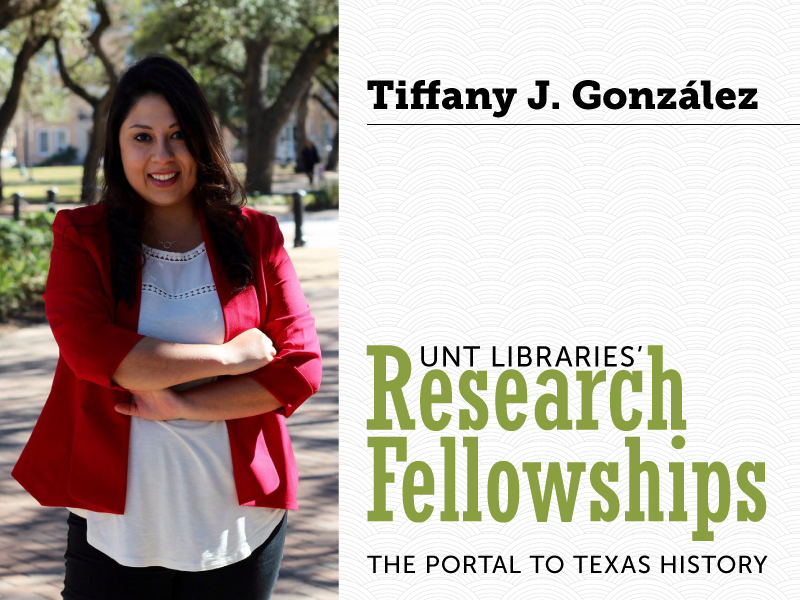
The Portal to Texas History 2017 Research Fellowship Awardee - Tiffany J. González
Tiffany J. González grew up in Chicago, Illinois, and in North Richland Hills, Texas. Currently she is a doctoral candidate in the department of history at Texas A&M University. She earned both her bachelor’s and master’s degree in History from Texas Tech University. In the 2017-2018 academic year, Tiffany will conduct more research and begin the writing phase for the dissertation. Her work has received support from the Texas State Historical Association, the East Texas Historical Association, the Texas Association of Chicanos in Higher Education, and now the Portal to Texas History. The University of North Texas Libraries invite applications for the 2017 The Portal to Texas History Research Fellowship. Research using the Portal is relevant to studies in a variety of disciplines including history, journalism, political science, geography, and American studies. We encourage applicants to think creatively about the opportunities that research with large digital library collections can enable. Preference will be given to applicants who demonstrate the greatest potential for publication and the best use of The Portal to Texas History. The Portal to Texas History 2017 Research Fellowship Awardee Tiffany J. Gonzalez Project Title The Globalization of the Latina Political Movement since the 1970s Project Description Tiffany’s project tells the story of the earliest Chicana/Latina politicians elected to office, the National Chicana Political Caucus, and the international feminist movement since in the 1970s. Her work elevates the field of American political history because of its analysis of the U.S. Latina political movement. Biography Tiffany J. González grew up in Chicago, Illinois, and in North Richland Hills, Texas. Currently she is a doctoral candidate in the department of history at Texas A&M University. She earned both her bachelor’s and master’s degree in History from Texas Tech University. In the 2017-2018 academic year, Tiffany will conduct more research and begin the writing phase for the dissertation. Her work has received support from the Texas State Historical Association, the East Texas Historical Association, the Texas Association of Chicanos in Higher Education, and now the Portal to Texas History. digital_libraries_in_the_news_honors_and_awards_research_fellowships
Posted:
06/16/2017
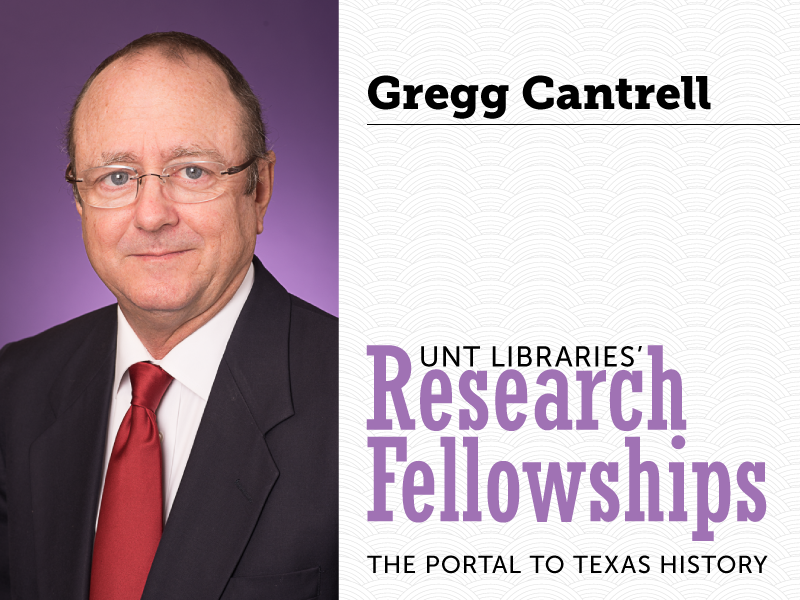
The Portal to Texas History 2017 Research Fellowship Awardee - Gregg Cantrell
Gregg Cantrell holds the Erma and Ralph Lowe Chair in Texas History at Texas Christian University. He is the author of several books and articles, including Stephen F. Austin: Empresario of Texas. He is a coauthor of the bestselling Texas History textbook, The History of Texas, coauthored with Robert A. Calvert and Arnoldo De León. In 2013-2014 he was president of the Texas State Historical Association, and he is a member of the Texas Institute of Letters. The University of North Texas Libraries invite applications for the 2017 The Portal to Texas History Research Fellowship. Research using the Portal is relevant to studies in a variety of disciplines including history, journalism, political science, geography, and American studies. We encourage applicants to think creatively about the opportunities that research with large digital library collections can enable. Preference will be given to applicants who demonstrate the greatest potential for publication and the best use of The Portal to Texas History. The Portal to Texas History 2017 Research Fellowship Awardee Gregg Cantrell Project Title The People’s Revolt: Texas Populists and the Roots of American Liberalism Project Description This project is a history of the Texas Populist Party of the 1890s. Populism was arguably the most successful and important third-party movement in American History, and Texas was the birthplace of Populism and home to more Populists than any other state. The ideas of Texas Populists were instrumental in the shaping of American liberalism in the twentieth century. Biography Gregg Cantrell holds the Erma and Ralph Lowe Chair in Texas History at Texas Christian University. He is the author of several books and articles, including Stephen F. Austin: Empresario of Texas. He is a coauthor of the bestselling Texas History textbook, The History of Texas, coauthored with Robert A. Calvert and Arnoldo De León. In 2013-2014 he was president of the Texas State Historical Association, and he is a member of the Texas Institute of Letters. digital_libraries_in_the_news_honors_and_awards_research_fellowships
Posted:
06/16/2017
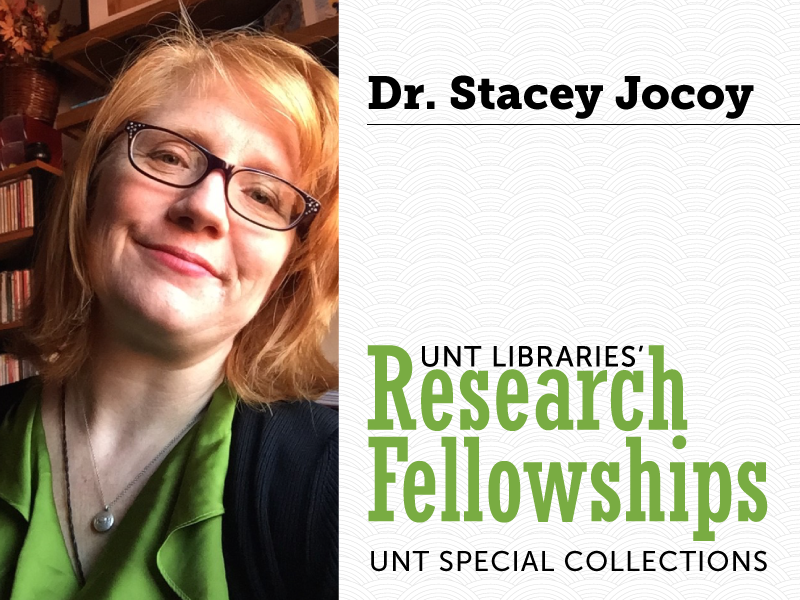
The UNT Special Collections 2017 Research Fellowship Awardee - Stacey Jocoy
Dr. Stacey Jocoy is Associate Professor of Musicology at Texas Tech University, School of Music. She is an Early Modern specialist focused on the material culture, cultural politics, and historiography of the period. The University of North Texas Libraries invite applications for the 2017 UNT Special Collections Research Fellowship. Research in special collections is relevant to studies in a variety of disciplines including history, journalism, political science, geography, fine art, art history and American studies. We encourage applicants to think creatively about new uses for special collections. Preference will be given to applicants who demonstrate the greatest potential for publication and the best use of special collections at UNT Libraries. The UNT Special Collections 2017 Research Fellowship Awardee Dr. Stacey Jocoy Project Title Helen Hewitt, a musicological pioneer Project Description This is a biographical, historiographical inquiry into the musicological career of Dr. Helen Hewitt (1900-1977). I will focus on the Hewitt Research Collection in the hopes of better understanding the focus and impact of her research in and beyond her lifetime. Biography Dr. Stacey Jocoy is Associate Professor of Musicology at Texas Tech University, School of Music. She is an Early Modern specialist focused on the material culture, cultural politics, and historiography of the period. Her work has focused on intersections of music and politics, particularly during the English Civil War of the seventeenth century, on the careers of related composers and the music publisher, John Playford. She has presented internationally and has been the recipient of several awards, most notably from the Folger Shakespeare Library and the William Andrews Clark Library, UCLA. special_collections_in_the_news_honors_and_awards_research_fellowships
Posted:
06/16/2017
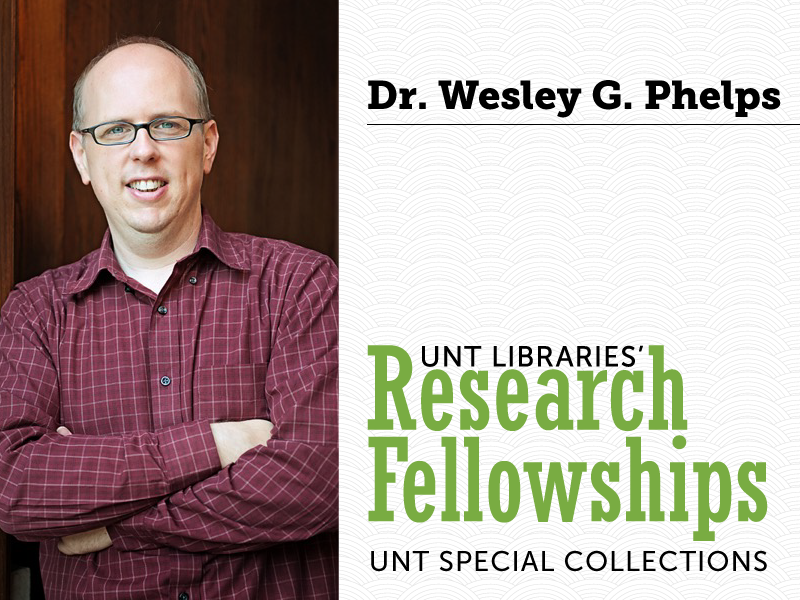
The UNT Special Collections 2017 Research Fellowship Awardee - Wesley G. Phelps
Wesley G. Phelps received his B.A. and M.A. from the University of North Texas and his Ph.D. in history from Rice University. His current research focuses on gay and lesbian political activism in the late twentieth century. The University of North Texas Libraries invite applications for the 2017 UNT Special Collections Research Fellowship. Research in special collections is relevant to studies in a variety of disciplines including history, journalism, political science, geography, fine art, art history and American studies. We encourage applicants to think creatively about new uses for special collections. Preference will be given to applicants who demonstrate the greatest potential for publication and the best use of special collections at UNT Libraries. The UNT Special Collections 2017 Research Fellowship Awardee Dr. Wesley G. Phelps Project Title Before Lawrence v. Texas: Legal Challenges to Texas Sodomy Laws, 1867-2003 Project Description This book project will investigate legal challenges to Texas sodomy laws before the landmark 2003 Supreme Court decision in Lawrence v. Texas, which finally invalidated all remaining state sodomy laws in the United States. I will pay particular attention to the ways in which gays, lesbians, and their allies struggled to develop legal, political, and educational strategies based on privacy, due process, and equal protection under law. Biography Wesley G. Phelps received his B.A. and M.A. from the University of North Texas and his Ph.D. in history from Rice University. He is currently an assistant professor of history at Sam Houston State University in Huntsville, Texas, where he teaches courses on recent United States history, the American South, and LGBTQ history. His first book, A People’s War on Poverty: Urban Politics and Grassroots Activists in Houston, was published by the University of Georgia Press in 2014. His current research focuses on gay and lesbian political activism in the late twentieth century. special_collections_in_the_news_honors_and_awards_research_fellowships
Posted:
06/16/2017
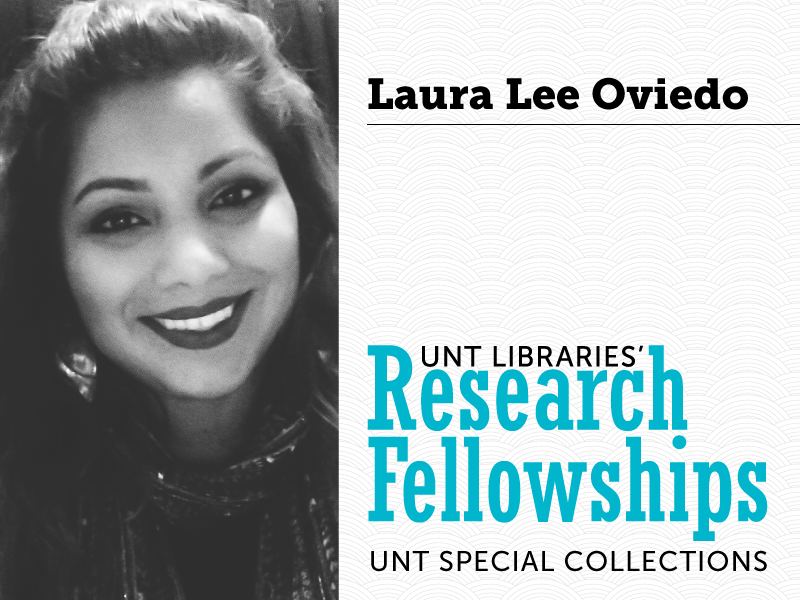
The UNT Special Collections 2017 Research Fellowship Awardee - Laura Lee Oviedo
Laura Lee Oviedo is a native of Pharr, Texas and is currently a Ph.D. student of history at Texas A&M University. Laura’s dissertation employs a comparative framework to examine the Militarization of Mexican and Puerto Rican Women’s Lives during World War II and the Politics of Race, Class, Gender, and Citizenship. The University of North Texas Libraries invite applications for the 2017 UNT Special Collections Research Fellowship. Research in special collections is relevant to studies in a variety of disciplines including history, journalism, political science, geography, fine art, art history and American studies. We encourage applicants to think creatively about new uses for special collections. Preference will be given to applicants who demonstrate the greatest potential for publication and the best use of special collections at UNT Libraries. The UNT Special Collections 2017 Research Fellowship Awardee Laura Lee Oviedo Project Title Militarization of Mexican and Puerto Rican Women’s Lives during World War II and the Politics of Race, Class, Gender, and Citizenship Project Description Laura’s project, The Militarization of Mexican and Puerto Rican Women’s Lives during World War II and the Politics of Race, Class, Gender, and Citizenship, utilizes a gendered lens of militarization in order to better understand the structural and ideological forces that shaped ethnic Mexican and Puerto Rican women’s lived experiences, social Laura Lee Oviedo is a native of Pharr, Texas and is currently a PhD student of history at Texas A&M University. Her research utilizes interdisciplinary and relational approaches to study the experiences of Latina/os in the United States, U.S./Mexico borderlands, Chicana/Latina feminisms and labor, identity politics, race/ethnic relations, and the relationship between war, citizenship, and gender. Laura’s dissertation employs a comparative framework to examine the Militarization of Mexican and Puerto Rican Women’s Lives during World War II and the Politics of Race, Class, Gender, and Citizenship. She has been hosted as a visiting scholar at the Institute for Caribbean Studies at the University of Puerto Rico and has presented her research at the American Sociological Association, National Women’s Studies Association, National Association of Chicana and Chicano Scholars, Dale Center for the Study of War & Society, Texas State Historical Association, among others.relations, ideologies, and practices during a heavily militarized climate in the mid-twentieth century. Most importantly, it examines the roles of these mujeres as cultural consumers and producers, sex workers, (in)formal wage laborers, as soldiers in the newly formed auxiliary units of the U.S. military (Women’s Army Corps, WAVES, etc), and as wives and mothers of military soldiers. Biography Laura Lee Oviedo is a native of Pharr, Texas and is currently a Ph.D. student of history at Texas A&M University. Her research utilizes interdisciplinary and relational approaches to study the experiences of Latina/os in the United States, U.S./Mexico borderlands, Chicana/Latina feminisms and labor, identity politics, race/ethnic relations, and the relationship between war, citizenship, and gender. Laura’s dissertation employs a comparative framework to examine the Militarization of Mexican and Puerto Rican Women’s Lives during World War II and the Politics of Race, Class, Gender, and Citizenship. She has been hosted as a visiting scholar at the Institute for Caribbean Studies at the University of Puerto Rico and has presented her research at the American Sociological Association, National Women’s Studies Association, National Association of Chicana and Chicano Scholars, Dale Center for the Study of War & Society, Texas State Historical Association, among others. special_collections_in_the_news_honors_and_awards_research_fellowships
Posted:
06/16/2017
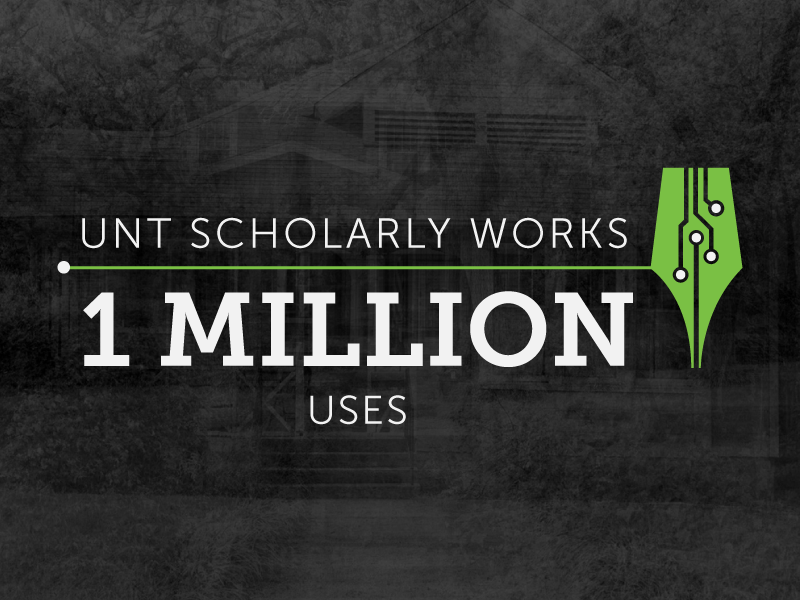
UNT Scholarly Works Milestone - One Million Uses
The UNT Scholarly Works collection celebrates passing the milestone of over one million uses. This week, the UNT Scholarly Works collection celebrates passing the milestone of over 1 million views. This collection is home to UNT faculty, staff, and student scholarship to provide long-term preservation and open access for these works. UNT Scholarly Works houses over 4,000 with items from every college of the university to bring together their articles, papers, presentations, books, chapters, reviews, academic posters, artwork, and other scholarly and creative works. These works are made readily accessible to showcase UNT’s research and creative achievements to a worldwide audience. This collection also serves as the open access repository for UNT. digital_curation_unit_in_the_news_about_the_libraries_did_you_know_collection_highlight
Posted:
06/09/2017
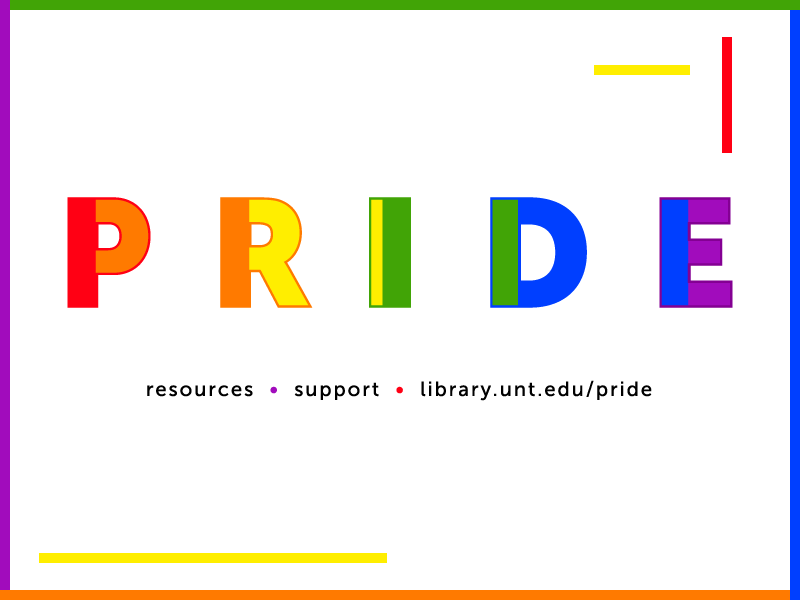
PRIDE: LGBTQ+ Resources & Support
The University of North Texas provides information, resources, and support for LGBTQ+ individuals and allies. The University of North Texas provides information, resources, and support for LGBTQ+ individuals and allies. Connect with others at UNT, the Denton area, and the North Texas region. UNT Libraries Resources The Portal to Texas History LGBT Collections The Gayly Oklahoman in the UNT Digital Library Lesbian, Gay, Bisexual and Transgender Archive Films and Documentaries The History of LGBT Organizations at UNT Support UNT Pride Alliance Services On-Campus Resources Off-Campus Resources Local GLAD at UNT PFLAG Denton Denton LGBTQ Local Wiki user_interfaces_in_the_news
Posted:
06/08/2017
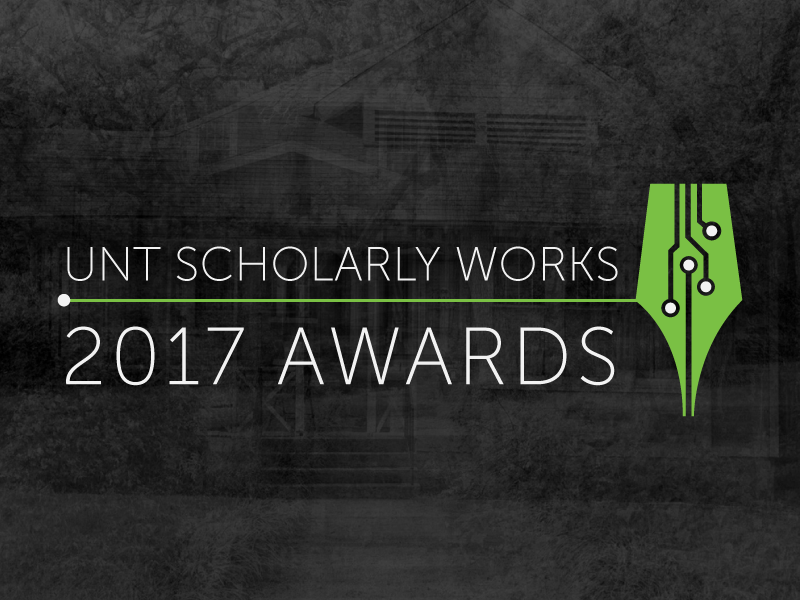
UNT Scholarly Works Outstanding Contributor Award 2017 Winners
About the Award Sponsored by the UNT Libraries, the 2017 UNT Scholarly Works Outstanding Contributor Award recognizes contributors whose items included in the UNT Scholarly Works institutional repository were accessed the most frequently and/or had the highest number of downloads. Awards are made in two categories: UNT Libraries Employees and Other UNT Community Members. Previous winners were ineligible. 2017 Winners Dr. Mark A. Vosvick Mark Vosvick is a behavioral scientist and associate professor of counseling psychology in UNT’s College of Arts and Sciences. Vosvick trained at Yale, Rutgers, Harvard, Stanford and the Medical College of Wisconsin before coming to UNT. Vosvick mentors both undergraduate and graduate students in research on psychosocial issues related to health and wellness in ethnic, racial, gender and sexual minority communities. Vosvick’s mentoring philosophy is holistic in that in addition to discipline content, he believes professional behavior and identity formation are all part of the educational process. As part of this philosophy, he encourages his students to give back through community engagement. From April 1, 2016 to March 31, 2017, Dr. Vosvick has contributed 63 items with a total of 276 uses during this period. His contributions include large-format posters produced through the Center for Psychosocial Health Research, in collaboration with graduate and undergraduate students, including several McNair Scholars. These items demonstrate the wide breadth of research conducted by his lab, their commitment to community engagement, and the numerous opportunities provided for mentorship and collaboration. You can view Dr. Vosvick’s works within the UNT Scholarly Works Collection. Dr. Catherine Sassen Catherine Sassen is the Principal Catalog Librarian at the University of North Texas Libraries. Previously she served as a catalog librarian at Georgia State University. She received her B.A. from the University of Montana, and her M.L.S. and Ph.D. from UNT. She has published and presented on cataloging, assessment, career development and indexing. From April 1, 2016 to March 31, 2017, Dr. Sassen has contributed 7 items with a total of 230 uses during this period. These contributions include not only her refereed journal articles, but also the data, survey instruments, bibliographies, and even authority record examples. This supplemental data allows users to gain a better understanding of the research she and her collaborators have conducted in library assessment and cataloging practices. You can view Dr. Sassen’s works within the UNT Scholarly Works Collection. digital_libraries_honors_and_awards
Posted:
06/01/2017
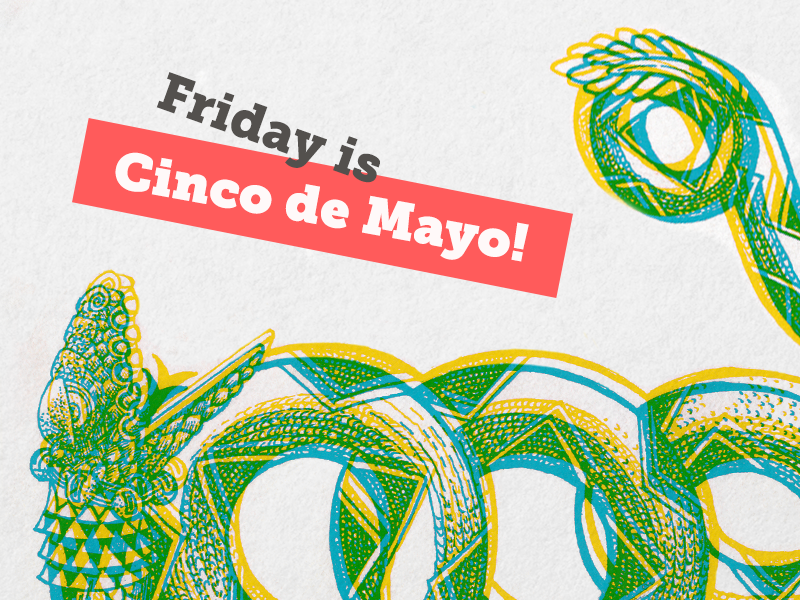
Celebrate Cinco de Mayo with UNT Libraries
Celebrate Cinco de Mayo and learn all about the history of this important holiday with UNT Libraries! Cinco de Mayo — celebrated on May 5 in Mexico and the United States —marks the anniversary of the 1862 Battle of Puebla, in which the outnumbered Mexican army, led by Ignacio Zaragoza, defeated the French during the Franco-Mexican war. Today, people across Mexico and the United States observe Cinco de Mayo, and it serves as a celebration of Mexican heritage and culture. With UNT Libraries, you can learn all about the history and tradition surrounding this important day: Read about the Battle of Puebla and the Franco-Mexican War through the UNT Library Catalog. Discover photos of past celebrations in The Portal to Texas History. Learn more about Mexican-American history through UNT Press. Watch a documentary through the Media Library. user_interfaces_in_the_news
Posted:
04/14/2017
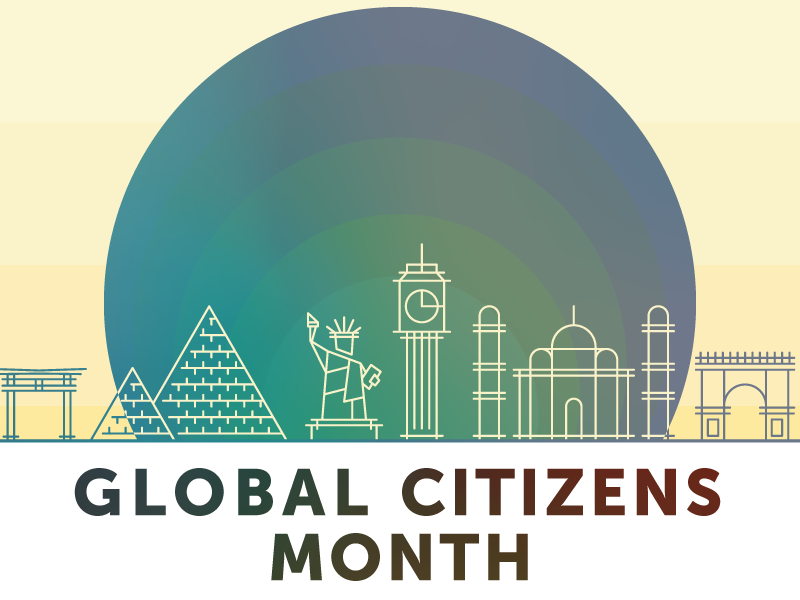
Global Citizens Month - April 2017
For the month of April, UNT will provide: “A variety of events, activities, and performances held across campus to educate students, faculty, staff and community members about world cultures and celebrations, diversity, internationalization and more”. See the UNT International April 2017 Calendar of events for more information. Library Events National Library Week events Date: April 3 - April 15 The Human Library Date: April 6 from 1:00 – 6:00 p.m. Location: Willis Library Forum Reel to Real Classics Discussion and Screening “The Immigrant” (Charlie Chaplin, silent, 1917) Date: April 26 from 5:00 - 6:00 pm Location: Willis Library, Room 340 Post and Intro Podcast Books The UNT Libraries contain multiple resources related to globalization and society, international education, and literature. Browse Subject Headings: World Citizenship, Multiculturalism In Literature Minorities in literature, Ethnic groups in literature, Immigrants in literature Group identity in literature, Ethnicity in literature Additional Resources A few print sources can currently be found on the Willis Library 1st floor Book Drop (available for check out): Educating global citizens in colleges and universities: challenges and opportunities Celebrations around the world: a multicultural handbook Our Feet Walk the Sky: Women of the South Asian Diaspora Becoming World Wise: A Guide to Global Learning Braided lives: an anthology of multicultural American writing Latina self-portraits: interviews with contemporary women writers The Americas of Asian American literature: gendered fictions of nation and transnation You can also browse our Willis 1FL Graphic Novels and current reading in our McNaughton lease books (bookshelf next to room 136). See Also UNT International #YouAreWelcomeHere video February Monthly Books display: All Are Welcome In The Library Pieces on Earth: A Celebration of World Culture and Literature monthly archived book list. Thanks (on behalf of the Global Citizens Committee)! ~ Lilly Ramin in_the_news
Posted:
04/01/2017
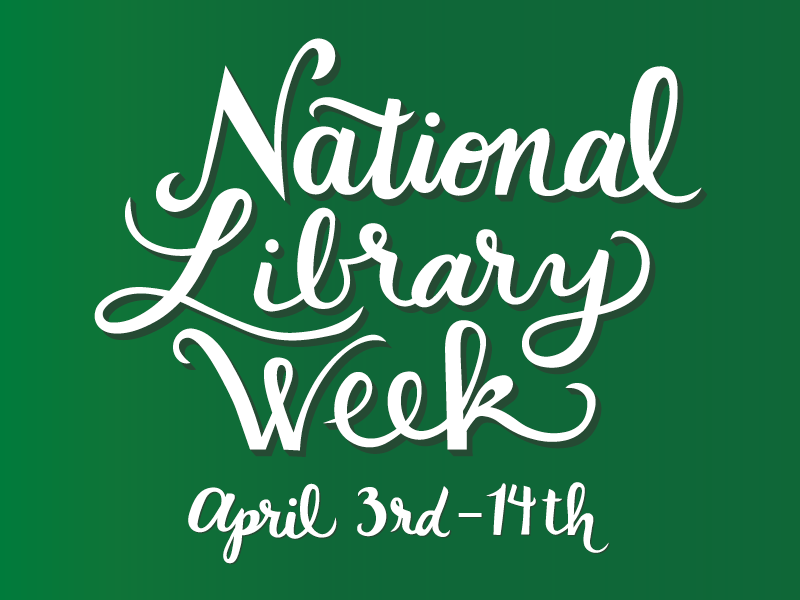
National Library Week 2017
National Library Week is the week of April 9th–15th, but the UNT Libraries have so much to offer our community, we have to make it a two-week celebration starting April 3rd! The theme this year is “Libraries Transform,” the campaign is designed to increase public awareness of the value, impact, and services provided by libraries and library professionals…showcasing the transformative nature of today’s libraries and elevating the critical role libraries play in the digital age.” During our National Library Week celebrations and in the week leading up to them, you will see lawn signs on campus with “Libraries Transform Because…” If you’d like to share with us how libraries have made an impact in your lives, please let us know on social media using #UNT #LibrariesTransform, or email us. Schedule of Events Week 1 Book History Maker Fair April 3rd | 4 pm | Willis Library Forum Data Day w/ The Libraries April 5th | 1–5 pm University Union, Room 344 Game On: Cosplay Night April 5th | 4–9 pm | Media Library, Chilton 111C The Human Library April 6th | 1–6 pm | Willis Library Forum Writings from WWI in America April 6th | 2–4 pm | Willis Library, Room 250H Schedule of Events Week 2 Eagle Commons Library Tabling April 10th | 9–11 am Outside Sycamore Hall Willis Library Tabling April 10th | 11 am–1 pm | Library Mall Media Library Tabling April 10th | 1–3 pm | Outside Chilton Hall Edible Books Festival April 10th | 1–3 pm | Willis Library Forum Grad Student Library Expo April 10th | 1–3 pm | Willis Library, Room 250H Collaborating with Strangers: Fake News April 11th | 2:30–4 pm Willis Library Forum Comics in the Academy April 13th | 4 pm | Willis Library Forum Fem Flicks Film Series: Brave Miss World April 13th | 4 pm Media Library, Chilton 111C Pixels & Pieces Speaker: Sean McCoy April 13th | 6 pm | Media Library, Chilton 111C public_services_in_the_news
Posted:
03/27/2017
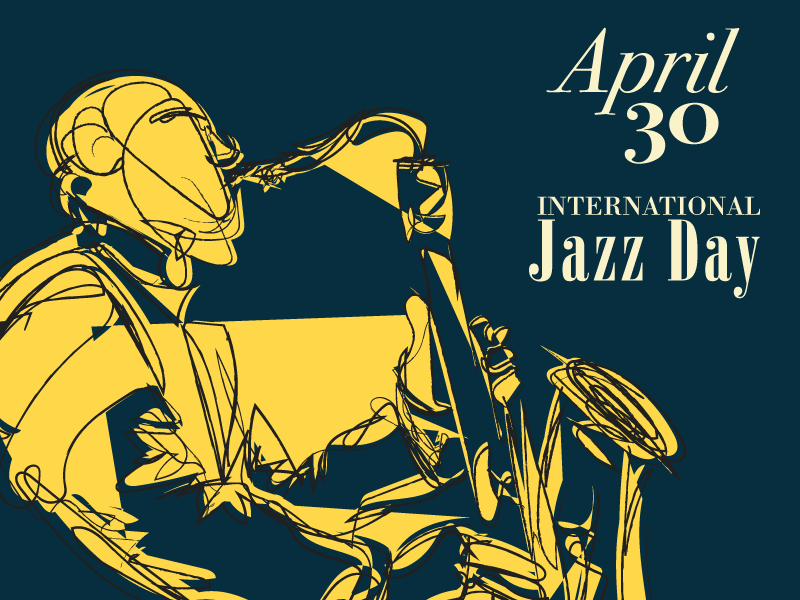
International Jazz Day
International Jazz Day is April 30 and there’s no better place to celebrate than UNT! Since its birth in early 20th century New Orleans, jazz music has captivated the hearts and minds of millions across the globe. Because of its important role in bridging cultures and connecting people, UNESCO (United Nations Educational, Scientific and Cultural Organization) declared April 30 International Jazz Day, with special events and celebratory campaigns led by the Thelonious Monk Institute of Jazz. For UNT, the day, an extension of Jazz Appreciation Month, is particularly special given the rich and storied history of the university’s jazz program, which has consistently ranked in the top three in the nation and celebrates its 70th anniversary this year. UNT Libraries has tons of awesome resources for you to celebrate this unique genre of music: Listen to recordings or check out musical scores from the Music Library. Explore the North Texas Lives of Musicians Series from UNT Press. Check out a book from the Library Catalog. Stream or check out a physical copy of various jazz films and documentaries from the Media Library. Explore the works of renowned jazz conductor Stan Kenton with UNT’s Stan Kenton Collection. Take a glimpse into the past through photos of past iterations of UNT’s famous lab bands from The Portal to Texas History. You can also plug into the local jazz scene by attending the free Denton Arts and Jazz Festival on April 28, 29, and 30. While you’re there, make sure to check out all the groups from UNT jazz who will be performing all three days of the festival. user_interfaces_in_the_news
Posted:
03/20/2017
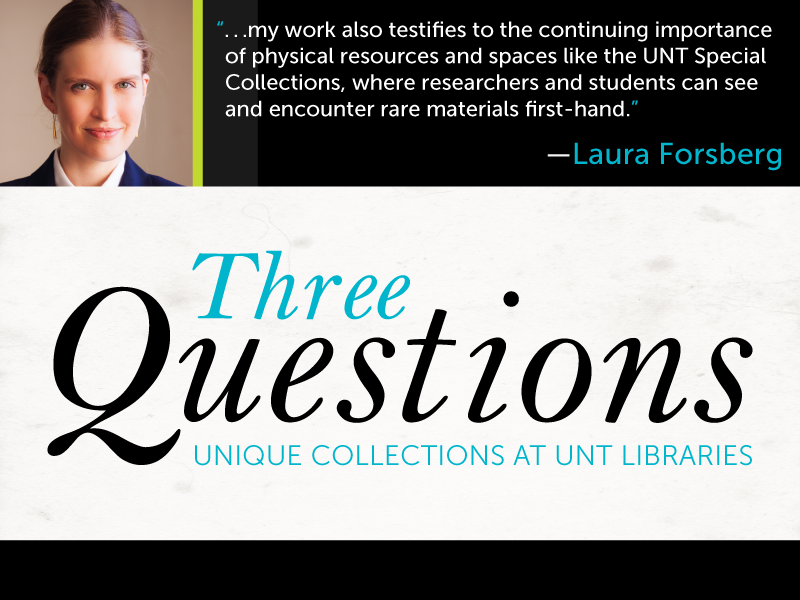
Three Questions with Laura Forsberg
Laura Forsberg is currently a long-term National Endowment for the Humanities fellow at the Huntington Library. She received her Ph.D. from Harvard University in 2015 and has taught at Concordia University Texas since 2014. Her articles on Victorian literature and culture have been published in Victorian Studies, SEL: Studies in English Literature 1600-1900 and Papers of the Bibliographical Society. Three Questions is an initiative to share the value that our faculty, students, and others in the UNT community derive from using The Portal to Texas History at UNT Libraries. How important are Unique Collections in your teaching, learning or research? The Unique Collections play a vital role in my research by opening up a new dimension of nineteenth-century culture. I’m currently completing a book that is tentatively entitled Worlds Beyond: Miniatures in the Victorian Age, which examines a widespread Victorian fascination with miniature things, including paintings, microscopes, fairies, toys and books. The Unique Collections at UNT and other archives around the country have allowed me to examine hundreds of nineteenth-century miniature books – including some of the 2000+ volumes in UNT’s miniature book collection. The miniature books in UNT’s collections include works that reflect the extraordinary craftsmanship that was required in miniature book production. In order to print the extremely rare Galileo a Madama Cristina di Lorena (1615), an 1896 book measuring just ½ by ¾ of an inch in size, typesetters handset 2 ½ point type (remember that our normal font is 12 point). In the process, both the compositor and the typesetter ruined their eyesight. The question is: why make a book like this? As I held the volume in the palm of my hand, one answer became clear: the reduction in scale renders this volume an object of pure enchantment. Galileo’s letter about the nature of the heavens has been condensed to half the size of a postage stamp. Libraries are digitizing more and more of their resources. In general, this is a great thing and it has been helpful for other parts of my research. But my work also testifies to the continuing importance of physical resources and spaces like the UNT Special Collections, where researchers and students can see and encounter rare materials first-hand. How have Unique Collections changed the way you approach your research, teaching or learning? I started graduate school with a textual approach to literature; I read books and poems and analyzed the relationship between content and form. Discovering the Unique Collections was part of a larger shift in my thinking, in which I began to focus on how literature fits into broader patterns in culture. In my current research, I not only analyze literary texts, but also “read” Victorian objects. Miniature books are particularly interesting objects to study because we can read both the text and the object – and sometimes they say different things! Miniature reference volumes, like The Little Lexicon, or, Multum in Parvo of the English Language, often explain how useful they are to readers. When I hold the object in my hand, however, I can see it’s very inconvenient to use; I struggle to turn thin pages, to hold the book open without blocking the type, and to read the tiny font. The book is, in fact, much less useful than it claims to be. This suggests that buyers probably purchased it because they were enchanted by its form and not because they found it useful. These insights are helpful not just for my research, but also for my teaching. All of my English courses now incorporate elements of visual and material analysis; my students spend time thinking about how we can interpret the material qualities of objects that we typically take for granted. What do you want others to know about your research, teaching or learning? Many of us, when we see a miniature object or thing, automatically respond to it as “cute” or categorize it as a curiosity. I hope that my research causes people to look beyond this instinctual response – especially when the object is historical or hand crafted. How was it made? Why? What labor went into its production and why on earth would someone devote so much effort to making such a tiny thing? By describing an object as cute or by categorizing it as a curiosity, we dismiss the oddity of things rather than seeking to interpret it. I hope that my project inspires others to look more closely at miniature objects and at material things more generally – including both books and artifacts – and to discover the often-overlooked richness of the material past. I also hope others draw from my project a sense of the excitement of working on materials that have rarely been discussed. In my own case, lots of individuals collect miniature books and a few bibliographers have written authoritative guides to the subject. I am, however, one of the first literary critics to think about these materials at length. I’m thrilled to have the opportunity to do so – and I hope many others will follow in thinking about marvelous collections like the one held by the UNT Special Collections. Laura Forsberg is currently a long-term National Endowment for the Humanities fellow at the Huntington Library. She received her Ph.D. from Harvard University in 2015 and has taught at Concordia University Texas since 2014. Her articles on Victorian literature and culture have been published in Victorian Studies, SEL: Studies in English Literature 1600-1900 and Papers of the Bibliographical Society. external_relations_in_the_news_three_questions
Posted:
03/16/2017
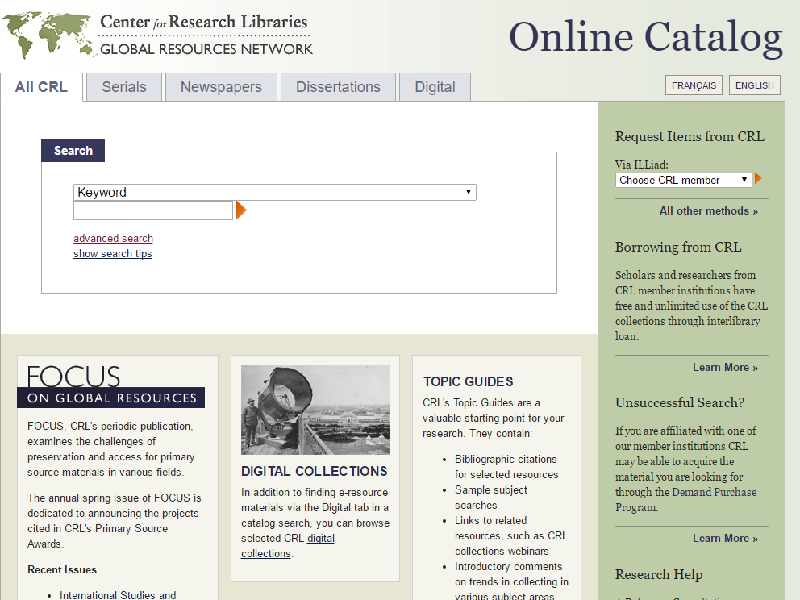
UNT Libraries renews membership in the Center for Research Libraries
The UNT Libraries has renewed our membership in the Center for Research Libraries (CRL). Through this partnership of over 200 university, college, and independent research libraries, faculty and students now have access to a large collection of electronic and physical items. UNT faculty and students are now able to access CRL’s extensive electronic collections and are able to borrow a huge number of physical items in print and microform through inter-library loan (ILL). These items are often difficult-to-find items such as foreign journals, books, dissertations dating back to the 1800s and newspapers. CRL’s collections provide access in support of a wide variety of disciplines including History, English, Economics, International Studies, Political Science, Law, Chemistry, Engineering, Music, and Visual Arts. These collections and items can be found through the following: CRL database - all materials, including those items only available through ILL Law Library Microform Consortium (LLMC) database Brazilian Government Documents database Through the CRL membership, UNT faculty and students are also able to take advantage of CRL’s reference consultation to assist in research and much more. collection_development_eresources
Posted:
03/14/2017
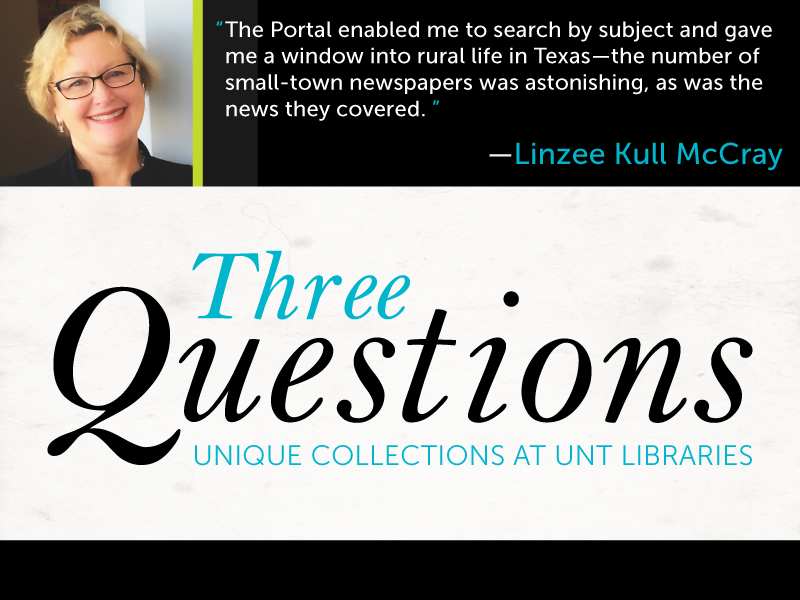
Three Questions with Linzee Kull McCray
Linzee Kull McCray is a writer and independent curator with a focus on art, textiles, and craft. She was a writer and editor of publications for the University of Iowa, has a master’s degree in journalism from the University, and taught magazine writing and reporting to UI journalism students. Her writing appears regularly in magazines and online. Three Questions is an initiative to share the value that our faculty, students, and others in the UNT community derive from using Unique Collections at UNT Libraries. How important are Unique Collections your teaching, learning or research? In 2016, I was working on a book about cotton commodity bags, better known as feed sacks. (The bags, which originally were white or had a company logo on them, were sewn from dress print fabrics beginning in the late 1930s through the early 1960s. They held everything from animal feed and agricultural seed to flour, sugar, and salt and were sometimes the sole source of fabric for rural families. Women used them to create curtains, diapers, dishtowels, dresses, quilts, and much more.) The Portal enabled me to search by subject and gave me a window into rural life in Texas—the number of small-town newspapers was astonishing, as was the news they covered. Feed sacks featured prominently in the “women’s sections” of papers and sometimes showed up on the front page, alongside more traditional news items. Having access to these newspapers gave me a detailed glimpse into the lives of rural and small town residents and allowed me to share stories like this with readers: “Alongside articles on wildcat wells and factory inspections, the front page of the March 21, 1935 Corrigan Press from Texas included the story ‘Mrs. Peebles Makes Mattress Cover.’ A member of the Lime Ridge Home Demonstration Club, Mrs. R.S. Peebles washed, bleached, and pressed eight feed sacks to make a mattress cover, ‘which can be removed and washed at any time.’ …Mrs. Peebles frugality was applauded. ‘Since buttons from discarded garments were used to fasten it at one end, the only cost of the well made substantial cover was the thread used in making it.’” Mrs. Peebles efforts inspired other women, who began saving fertilizer sacks to make similar items. How have Unique Collections changed the way you approach your research, teaching or learning? Because feed sacks were used all over the United States, I was especially pleased to have access to newspapers from a region other than where I live—I live in Iowa City, Iowa. It reminded me of the possibilities of broadening the scope of my study to additional regions and states where similar resources might be available. And I love sharing the Portal with people who are interested in digging further into the topic, or who are simply interested in day-to-day rural life in the early and mid 20th-century. What do you want others to know about your research, teaching or learning? Textiles and their use in rural life is a way to focus on women’s history. While some men certainly sewed, the majority of feed sack use in the home was by women. Feed sacks interest me from a number of perspectives: The fabric designs are rich and varied (more than 18,000 different fabrics have been documented, and there are many, many more. I love that women took the time to use feed sacks to create beauty, especially when they were already occupied with cooking, gardening, and raising children and chickens, among other tasks. Feed sacks represent recognition by manufacturers of women’s importance in deciding where and how their family’s precious financial resources would be spent. There are myriad stories of husbands and sons being sent to the feed store with a swatch of fabric in hand and the instructions to buy two more sacks of fabric just like it. (It took three to four bags to create the average woman’s dress). Women may not have been considered breadwinners, but cotton bag manufacturers’ marketing efforts were squarely directed at the housewife and not her husband. The power of women was clear, even if it wasn’t directly acknowledged. In addition, I used the substantial resources of the Briscoe Center for American History while visiting Austin in January, 2016. I hope that Texans appreciate the amazing collections at their disposal, as well as the knowledgeable staff members who help the pubic make use of them. Linzee Kull McCray is a writer and independent curator with a focus on art, textiles, and craft. She is the author of Feed Sacks: The Colourful History of a Frugal Fabric (UPPERCASE, Calgary, Canada, 2016). She was a writer and editor of publications for the University of Iowa, has a master’s degree in journalism from the University, and taught magazine writing and reporting to UI journalism students. Her writing appears regularly in magazines and online. Her book Art Quilts of the Midwest (University of Iowa Press, 2015) has been the subject of exhibitions at the International Quilt Study Center and Museum (Lincoln, NE), the National Quilt Museum (Paducah, KY), and the Iowa Quilt Museum (Winterset, IA). It will be on view at the Texas Quilt Museum (LaGrange, TX) from June 29 to October 1, 2017. external_relations_in_the_news_three_questions
Posted:
03/01/2017
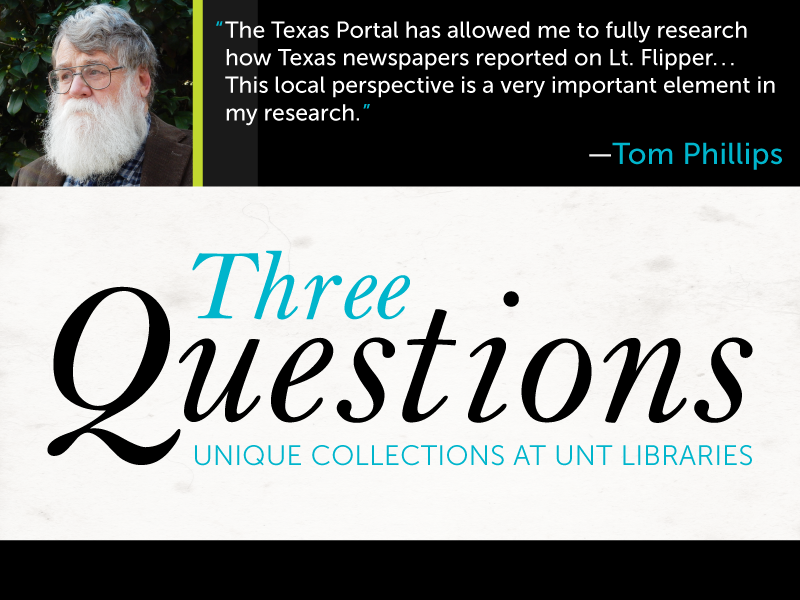
Three Questions with Tom Phillips
Tom Phillips is an independent historian and has a doctorate from the University of Wisconsin. His special interest is African American soldiers who served in the U.S. Army between the end of the Civil War and the early 1900s. He is the co-author of a book about these troops, The Black Regulars, 1866-1898, published by the University of Oklahoma Press in 2001. Three Questions is an initiative to share the value that our faculty, students, and others in the UNT community derive from using The Portal to Texas History at UNT Libraries. How important is the Portal in your teaching, learning or research? Very: I am researching the late 1881 court martial of Lieutenant Henry O. Flipper held at Fort Davis, Texas. He was the first African American graduate of West Point (1877) and the first black commissioned army officer. Much of my research has focused on newspaper accounts of this case. I’m a late-comer to the Portal, but arrived familiar with other digitized historical newspaper archives, especially Chronicling America from the Library of Congress. The Texas Portal has allowed me to fully research how Texas newspapers reported on Lt. Flipper. I have found a wide range of text, especially editorial views, in the state daily and weekly press. This local perspective is a very important element in my research. How has the Portal changed the way you approach your research, teaching or learning? No changes: but a continued and deeper application of research methods/skills (with a much- needed dose of luck and pure chance) that I’ve used for many years. I still travel to archives and libraries and rely on materials obtained through Interlibrary Loan. The Texas Portal and similar sites allow me to quickly find the “good stuff” from the comfort of my home office. Early in my research such discoveries would have required hours of squinting while scrolling through reels of microfilm or inhaling the dust of old printer’s ink and newsprint paper when turning pages in brittle original bound volumes of period newspapers. No more: now the items I’m looking for appear on my computer screen, and with the added and very welcome bonus of yellow underlining of the search word (s). What do you want others to know about your research, teaching or learning? Back in the 60s when I was an American History grad student I learned that “doing history” meant finding often obscure, over looked or long-forgotten pieces of information and then properly placing them in the overall national historic mosaic. My research is a process of searching, sometimes finding-sometimes not, sifting and winnowing, and then trying to organize and make sense of what I’ve found. My use of Texas Portal has once again shown me that there are more sources to mine and filter into my ongoing research. But…the ease and speed of using Texas Portal comes with a downside. I constantly have to force myself to stay on point and not use search words about subjects which have no relation to my research. Lieutenant Flipper’s story is of primary interest, but I can be easily distracted by reports of local crime, political hanky-panky (lots of both in 1880s Texas) and those wonderful period advertisement for $1 bottles of magic elixir that will cure everything from flat feet to lumbago to dandruff. Tom Phillips is an independent historian and has a doctorate from the University of Wisconsin. His special interest is African American soldiers who served in the U.S. Army between the end of the Civil War and the early 1900s. He is the co-author of a book about these troops, The Black Regulars, 1866-1898, published by the University of Oklahoma Press in 2001. external_relations_in_the_news_three_questions
Posted:
02/27/2017
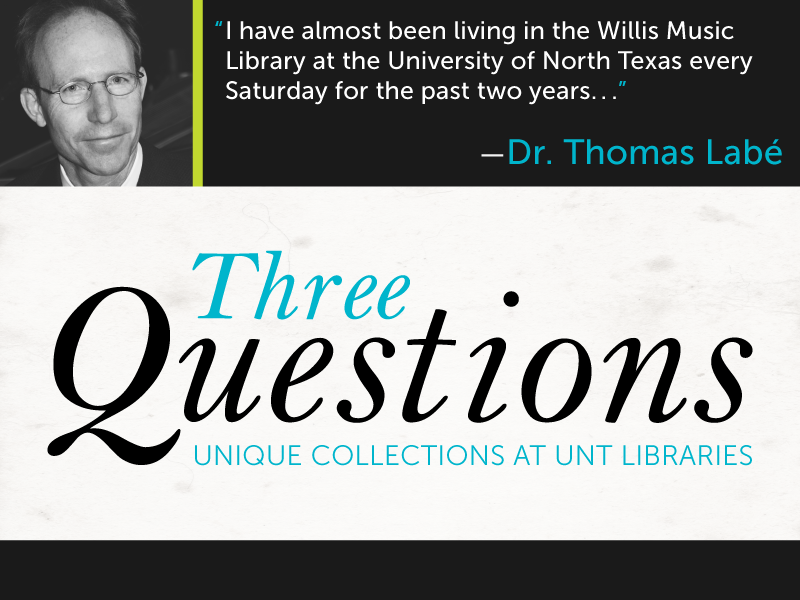
Three Questions with Thomas Labé
Thomas Labé enjoys a multifaceted career as a pianist, recording artist, published scholar and educator. Performing, teaching and presenting have taken him to all seven continents. He has been at the forefront of bringing his passion for music to the classroom, the hybrid and the online learning environments in the most vital and effective ways possible. He has given presentations on the creative use of technology for teaching at several eLearning conferences ranging from Oklahoma to Hong Kong. He is currently Professor of Music (piano) at Cameron University in Lawton, Oklahoma. Three Questions is an initiative to share the value that our faculty, students, and others in the UNT community derive from using the Unique Collections at UNT Libraries. How important are Unique Collections in your teaching, learning or research? I have almost been living in the Willis Music Library at the University of North Texas every Saturday for the past two years while working on my openly-licensed music appreciation textbook. When it is completed this spring it will consist of a fully searchable, printable online page-flipping textbook which is completely integrated with a responsive website and an online multimedia pronouncing lexicon. All materials will be available for use in the classroom, on any computer or portable device, for hybrid and online instruction and available for student access 24/7. The textbook itself runs to almost 5,000 pages and combined with the website there are over 2,000 high definition images, graphics and links to hundreds of video and audio files. Because it is openly-licensed it will be absolutely free for instructors and students to use worldwide. How have Unique Collections changed the way you approach your research, teaching or learning? I build dedicated responsive websites for all the courses that I teach. I also require my students to go paperless and learn basic graphics and website coding skills. All that said, I believe strongly in the power of print and/or print available as electronic resources. The most reliable information is still published in print form, issued by reputable publishing houses and which have gone through rigorous scholarly and editorial review. There is also something unique about walking through library stacks: you can discover things that no internet search will ever uncover. At times I have been at the Willis Music Library and been overwhelmed at how much literature has been written about music, more literature I believe than on any other human endeavor. What do you want others to know about your research, teaching or learning? Music appreciation is the most unique general education course on a college campus because every single student entering the class has already developed an intense relationship with the subject, music. You simply cannot say that about any other course on a college campus. So for me it is all about meeting the students in their individual relationship with music and working to expand horizons. I am hoping that my textbook/website complex will help in expanding those horizons. Thomas Labé enjoys a multifaceted career as a pianist, recording artist, published scholar and educator. Performing, teaching and presenting have taken him to all seven continents. A prize winner in numerous international piano competitions, his Carnegie Hall debut in 1987 was singled out by The New York Times as the “most interesting among the weeks’ debutants.” His first solo piano recording, The Virtuoso Johann Strauss, received a “Best of the Year” citation. He has been at the forefront of bringing his passion for music to the classroom, the hybrid and the online learning environments in the most vital and effective ways possible. He has given presentations on the creative use of technology for teaching at several eLearning conferences ranging from Oklahoma to Hong Kong. He is currently Professor of Music (piano) at Cameron University in Lawton, Oklahoma. external_relations_in_the_news_three_questions
Posted:
02/23/2017
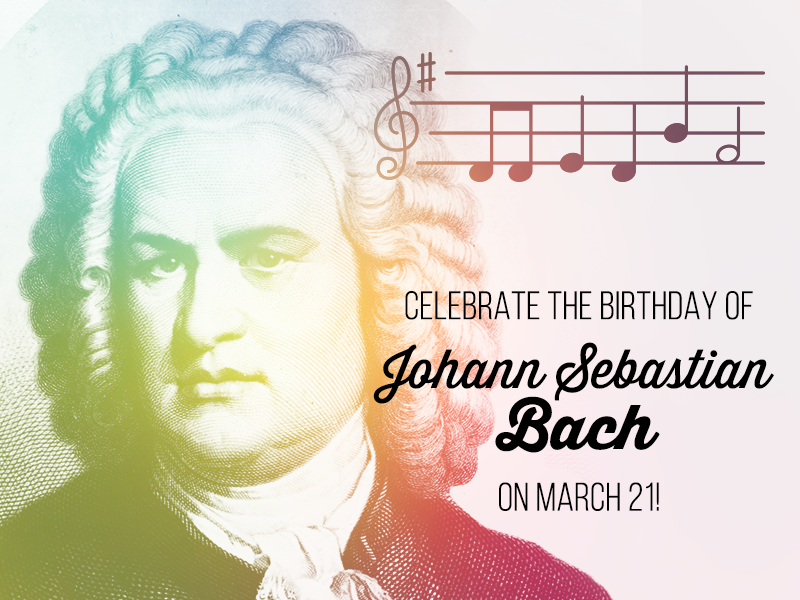
Happy Birthday J.S. Bach
Celebrate the Father of Music’s birthday on March 21. Few men in history have a reputation like the “Father of Music,” but Johann Sebastian Bach’s life and work certainly earned him that title. The renowned musician and composer was born in Eisenach, Germany on March 21, 1685, the youngest of eight children. Over the course of his life, he made significant contributions to music, including advancement in the use of modulations, four-part harmonies, counterpoint, and structure in his compositions. In the spirit of UNT’s rich musical tradition, UNT Libraries has several resources that can help you expand your knowledge about J.S. Bach: Discover musical scores and recordings in the Library Catalog. Read about Bach’s life, music style, and influence. Watch a film or documentary from the Media Library. Bach was married twice and had 10 children that survived into adulthood, many of which went into music themselves. in_the_news
Posted:
02/20/2017

Texas Digital Newspaper Program reaches 5 Million Pages
The Digital Newspaper Unit of the UNT Libraries runs the Texas Digital Newspaper Program (TDNP) to digitally preserve Texas newspapers from any date and any place in the state of Texas. The TDNP collection is hosted on The Portal to Texas History and we are proud to announce that we are approaching a milestone of 5 million pages of Texas newspapers. The TDNP is intended to serve as a rich and diverse resource for preserving Texas history through newspapers and making it freely available to researchers worldwide. AS a result, we work with publishers, public and academic libraries, historical societies, museums, and private collectors. We believe that diversity and Texas newspaper history go hand in hand, and so we are always striving to increase the number and types of newspapers housed in this collection. Please note that the March 9th event is by invitation only. digital_newspaper_unit_collection_highlight
Posted:
02/16/2017
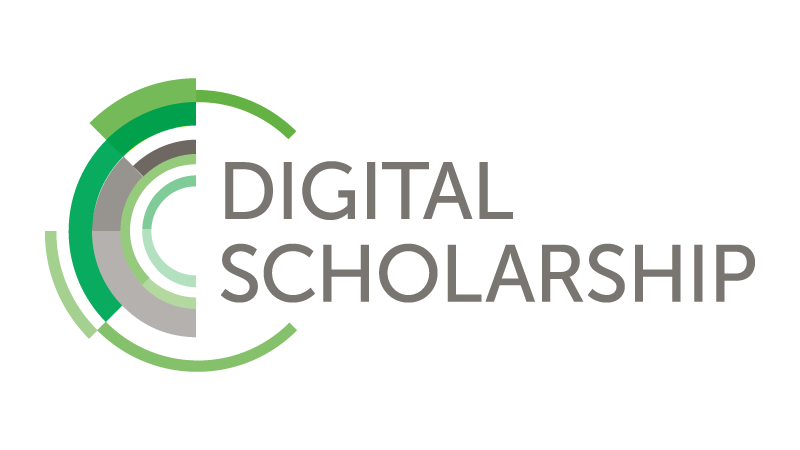
UNT Day of DH Call for Participants
A Day in the Life of the Digital Humanities (Day of DH) is an international celebration of technology in the service of the humanities. Join UNT librarians, faculty, staff, and students April 5, 2017 to learn about digital humanities concepts, projects, and tools. Help us build a great line up of speakers, workshops, and collaborative events. All UNT faculty, staff and students are welcome to participate and propose sessions. A Day in the Life of the Digital Humanities ([Day of DH][]) is an international celebration of technology in the service of the humanities. Join UNT librarians, faculty, staff, and students April 5, 2017 to learn about digital humanities concepts, projects, and tools. We define “digital humanities” broadly, and welcome digital scholarship practitioners from any discipline to contribute. Class projects, early stage projects, inquiries, and theoretical interventions are also welcome. Help us build a great line up of speakers, workshops, and collaborative events. All UNT faculty, staff and students are welcome to participate and propose sessions. Some ways you can contribute: Write a “Day in the Life” blog post or record a video describing a day in your life in digital humanities. Propose a hands-on workshop on a freely available tool for doing DH work. Propose a demo of a commercially available tool for doing DH work. Propose a workshop on digital pedagogy. Organize a panel of lightning talks highlighting different projects, strategies or ideas. Got other ideas? Tell us about them! Use this form to propose your contribution. Feel free to propose more than one (so if you do a workshop, you can also do a blog post about it, or anything else, too). Deadline for proposals is March 15, 2017. Questions? Please email digitalfrontiers@unt.edu Blog and video posts will be shared on the DH @ UNT blog. You can also follow @DH_UNT on Twitter for relevant news and updates. Sponsored by the UNT Libraries Digital Humanities and Collaborative Programs Unit, the UNT Libraries Digital Scholarship Work Group, the Critical Digital Pedagogy Faculty Network, and Digital Frontiers. in_the_news
Posted:
02/16/2017
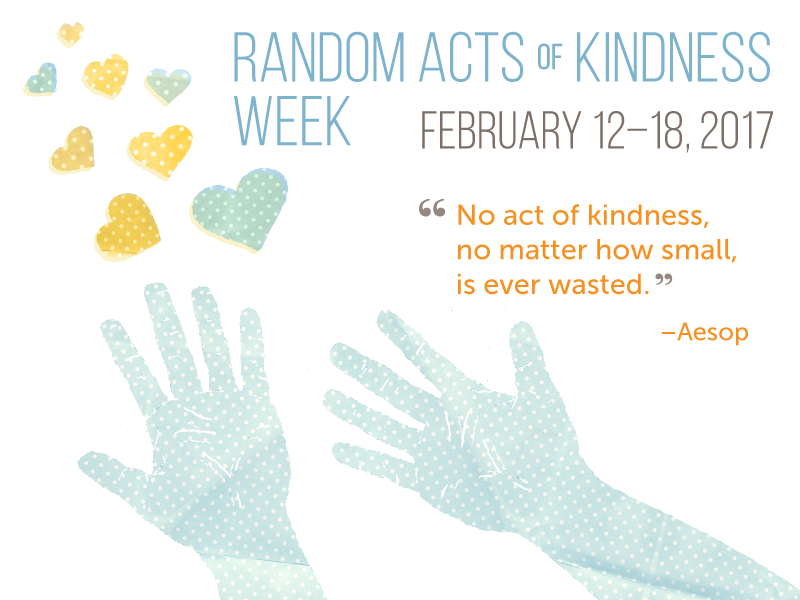
Random Acts of Kindness Week
Celebrate Random Acts of Kindness Week February 12 - 18, 2017. “A single act of kindness throws out roots in all directions, and the roots spring up to make new trees.” - Amelia Earheart The Random Acts of Kindness Foundation, or RAK, inspires people to become “RAKtivists,” or individuals who do small acts of random kindness for a stranger, bringing a little more positivity into the world. February 12 - 18, 2017 is Random Acts of Kindness Week, and we know the UNT community has some of the kindest people you could ever meet! If you or someone you see commits a Random Act of Kindness, please share it with us on social media using #UNT #RAKWeek2017. You can find us on Twitter, Instagram, and Facebook! in_the_news
Posted:
02/10/2017
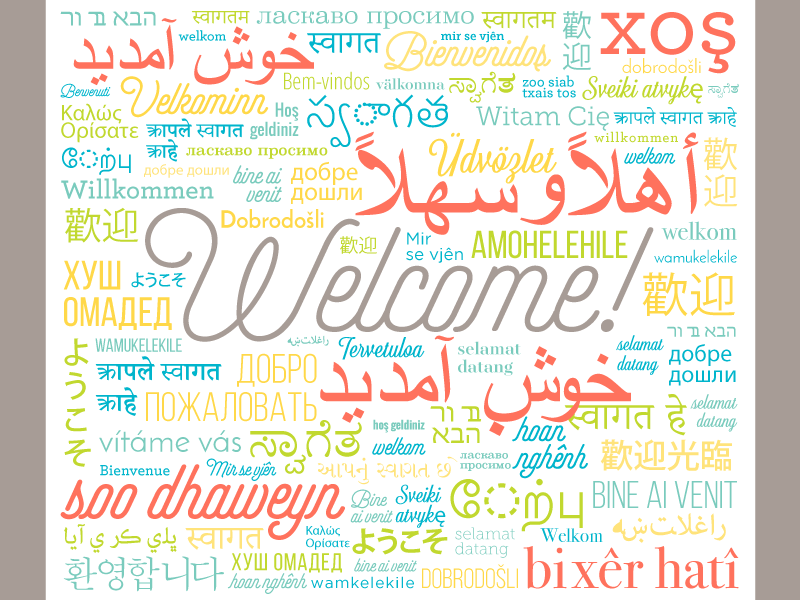
All Are Welcome In The Library
In support of our mission to provide leadership in innovation and learning, the Public Services Division of the University of North Texas Libraries affirms the principles described in the American Library Association’s Library Bill of Rights and Core Values of Librarianship. We are committed to welcoming the entire UNT community, in all its diversity, to enjoy the information and services provided by the Libraries. A message from the Public Services Division of the UNT Libraries to the UNT Community In support of our mission to provide leadership in innovation and learning, the Public Services Division of the University of North Texas Libraries affirms the principles described in the American Library Association’s Library Bill of Rights and Core Values of Librarianship. We are committed to welcoming the entire UNT community, in all its diversity, to enjoy the information and services provided by the Libraries. Members of the UNT community, or their friends and families, may be facing difficulty in light of recent changes in the nation’s political climate. Students needing information regarding changes in their residency status are encouraged to contact the following organizations: American Civil Liberties Union of Texas There are also a variety of resources available to UNT students. Any student concerned for their safety should contact the UNT Police Department. (940) 565-3000. In the event of an emergency, do not hesitate to call 911. The Care Team is available to assist in protecting the health, safety, and welfare of students and members of the UNT community. Counseling and Testing Services provides comprehensive psychological services to students. UNT International provides support for UNT’s international student and scholar community. The Division of Institutional Equity & Diversity works to create an inclusive environment at UNT. Student Legal Services offers a wide variety of legal guidance. Faculty and staff have access to free short-term, confidential counseling services through the UNT Employee Assistance Program. 1-800-343-3822 You can also Ask Us and we will do our best to help you find the information and resources you need. We are careful to ensure that our collections provide diverse points of view and perspectives, and information about different cultures. Visit our Monthly Books Display near the service desk, and visit the Forum Exhibit in Room 140 in Willis Library to see just a few of the diverse books in our collections. Find a book about your culture, or read a book about a culture you don’t know. Don’t see what you want? Please, Ask Us! Finally, part of our mission is to provide our students and the community with access to credible information, and to help them develop the skills to evaluate the information they consume. UNT Librarians developed a Media Literacy Guide to help our students and the wider community navigate the challenging information landscape. Our Reference and Subject Librarians are also available to help, either at the service desk, or by appointment. The UNT Libraries are here to serve the entire UNT community, and we want all of our students, faculty, and staff to know that you are welcome in the library. public_services_in_the_news
Posted:
02/07/2017
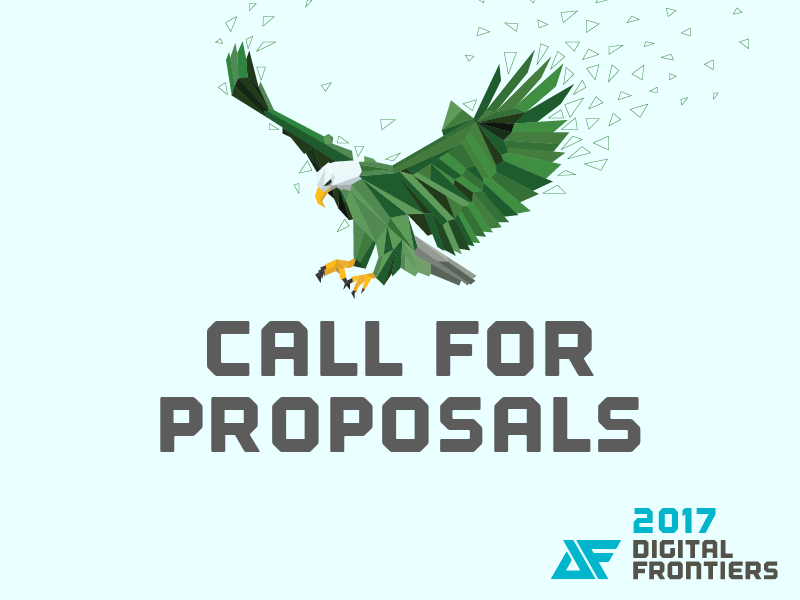
Exploring the Edges, Pushing the Boundaries: Digital Frontiers 2017 Call for Proposals
The call for proposals for the 2017 Digital Frontiers Conference and THATCamp is now open! Digital Frontiers is the largest and longest-running digital humanities conference in Texas. This year’s conference is September 21-23 at the University of North Texas, and features Keynote Speakers Jacqueline Wernimont and Stacie Williams. The [call for proposals][] for the 2017 Digital Frontiers Conference and THATCamp is now open! Digital Frontiers is the largest and longest-running digital humanities conference in Texas. Founded at UNT in 2012, Digital Frontiers is an annual conference that explores advances and research in humanities and cultural memory through the lenses of digital scholarship, technology, and multidisciplinary discourse. This year’s conference is September 21-23 at the University of North Texas, and features Keynote Speakers Jacqueline Wernimont and Stacie Williams. The theme for the 2017 Digital Frontiers Conference is Exploring the Edges, Pushing the Boundaries. The conference’s vision is to examine research and projects involving new or newly-applied technologies, concepts, processes, and methodologies; to highlight innovations, insights and emerging areas of research; to reach out to new audiences and communities, especially the underserved; to probe into efforts, both mainstream and on the margins, to achieve social justice via digital humanities resistance to the status quo; and to showcase practical applications of openly available tools and resources that foster investigations that may have been impossible or deemed unanswerable in the past. Submissions will be accepted through April 28, 2017. For full details on the conference and the call for proposals, please visit the conference website. public_services_in_the_news
Posted:
02/07/2017
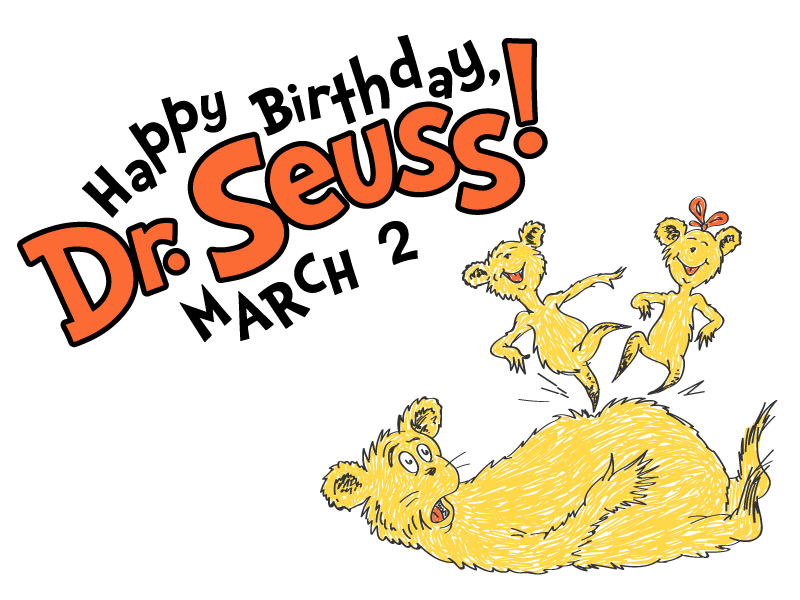
Happy Birthday, Dr. Seuss!
March 2 is the birthday of beloved author Theodor Seuss “Dr. Seuss” Geisel. Theodor Geisel, known more commonly by his pseudonym Dr. Seuss, was a beloved author and illustrator. Born on March 2, 1904, he created more than 60 books over the course of his career. His birthday marks a nationwide celebration of reading and spurred the creation of Read Across America, an annual reading awareness and motivation effort from the National Education Association. UNT Libraries can help you learn all about the beloved bard: Read a book written by Dr. Seuss Learn about the life and work of Theodor Geisel Watch a film adaptation of his work from the Media Library Take a look at the rare items related to Dr. Seuss in Special Collections. Geisel dedicated his life to creating works that told a story, usually containing hidden layers of meaning beneath a fun, colorful exterior. He created numerous political cartoons before and during WWII, criticizing Adolf Hitler and the Nazi regime. Other famous works, such as The Lorax and Horton Hears a Who, have been interpreted as carrying pro-environment and anti-discriminatory messages, respectively. Although his books were written for children, Geisel had a complicated life. He graduated from Dartmouth, lived through the suicide of his first wife, remarried, and never had any children of his own. He died in 1991 at his home in La Jolla, California, but his legacy lives on. Geisel’s books, cartoons, and stories captivated children for decades, and that same spirit is now echoed in Read Across America. This program provides parents, educators, and caregivers with resources to encourage children to read and love reading since May 1997. in_the_news
Posted:
01/30/2017
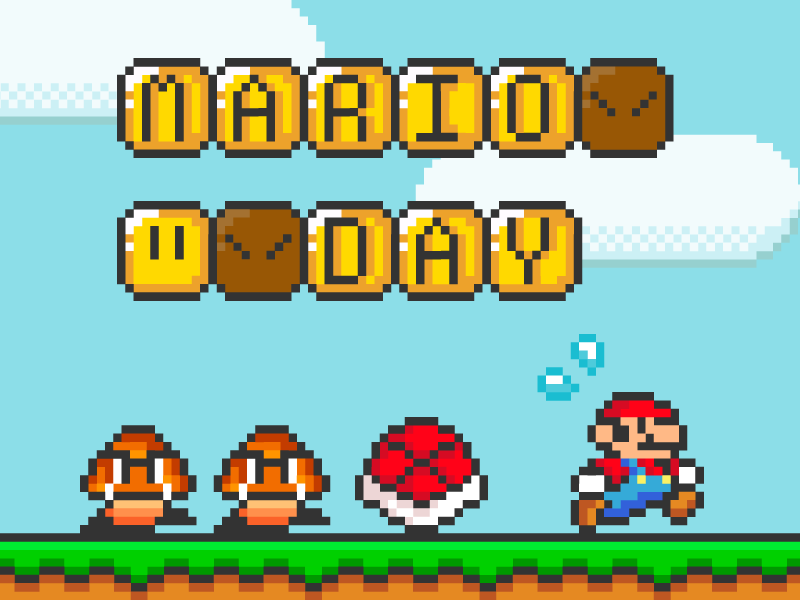
Level Up for Mario Day with UNT Libraries
Celebrate everyone’s favorite plumber on Mar.10! When considering the most iconic videogame characters of all time, it’s impossible not to include Nintendo’s Super Mario. March 10 marks official Mario Day because of the spelling of the abbreviation MAR10, which resembles this famous plumber’s name. UNT Libraries can help you level up your Mario knowledge through our numerous resources: Check out our assortment of Super Mario videogames Pick up a console from the Media Library, including Nintendo 3DS, PS4, Playstation, Wii, Wii U, and Xbox 360 Grab a videogame accessory to improve your gaming experience Read up on Nintendo history, research, and more through the Library Catalog Watch the 1993 movie Super Mario Bros. available in the Media Library Mario first came into existence in 1981, designed by Nintendo game designer Shigeru Miyamoto for the arcade game Donkey Kong. However, he wasn’t always Mario; he was initially known as “Jumpman,” and Princess Peach was originally “Princess Toadstool.” Through the decades, new characters have come and gone; settings and locations have changed; and graphics have improved in quality. With Mario and his subsequently created squad of friends and enemies, Nintendo has built a videogame empire, making them a household name across the globe. in_the_news
Posted:
01/27/2017
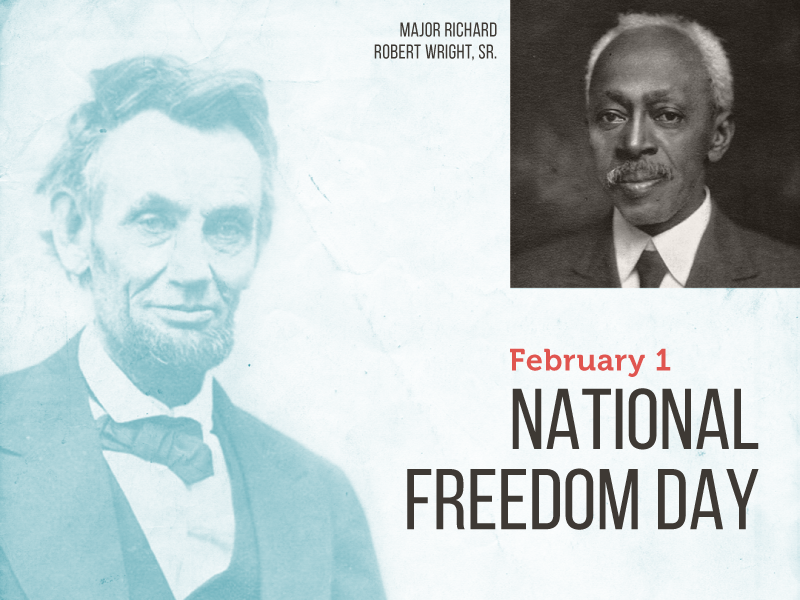
Celebrate National Freedom Day with UNT Libraries
On February 1, 1865, President Abraham Lincoln signed the 13th Amendment, officially outlawing slavery in the United States. On February 1, 1865, President Abraham Lincoln signed a joint congressional resolution proposing the 13th Amendment, taking legal steps to officially outlaw slavery in the United States. This was a momentous event in our history, as it followed the horror of the American slave trade and the Civil War. The push to create this national day of remembrance was led by Richard R. Wright, Sr., a former slave, military officer, educator, civil rights advocate and politician who argued that the signing was the true harbinger of freedom for African Americans instead of the Emancipation Proclamation.The signing of the 13th Amendment became a federally recognized holiday in 1949, when President Harry Truman issued a proclamation declaring it so. UNT Libraries has several key resources that can help you better understand the historical context and significance of this day: Check out a book or electronic resource about the 13th Amendment Learn about slavery in America and its effects See original documents about slavery, the effects of the 13th Amendment, and the Civil War on The Portal to Texas History Read about the Civil War in the Library Catalog in_the_news
Posted:
01/25/2017

Chinese New Year
January 28, 2017 marks the dawn of the Year of the Rooster! You can learn all about Chinese New Year history, traditions, and celebrations from the resources available from UNT Libraries. The Chinese New Year, also known as the Spring Festival, is a significant part of Chinese culture and tradition. It marks the the resetting of the lunar calendar, and every year is represented by one of twelve animals that symbolize different traits and luck for the new year. These rotate in a cyclical manner, with each sign resurfacing every 12 years. This Saturday, January 28, marks this change in the lunar calendar and the start of a new year. UNT Libraries has a wealth of resources relating to the New Year as well as Chinese culture. You can: Watch a documentary from the Media Library Read a book about the Chinese New Year Learn all about China’s history and growth Listen to music inspired by Chinese culture from the Music Library Traditions People across China and around the world celebrate the New Year by visiting family, feasting, and engaging in an extended period of optimism and hope for prosperity. Schools and universities in China take a break, and the 40 days surrounding the holiday mark the largest annual human migration on the planet - approximately 3.7 billion trips in total. The New Year’s Eve dinner is an important component of the festivities. Eight or nine dishes are usually served, as those numbers are considered lucky. Common foods served at dinner are dumplings and fish, which symbolize prosperity. Luck is integral to New Year traditions, with red, a famously lucky color, adorning decorations and clothing. Elders and adults give “red packets,” or red envelopes containing money, to young children to bring them good fortune in the new year. To avoid bad luck, people avoid taking medicine, sweeping, and needlework among other things on New Year’s Day. Certain gifts, such as clocks and knives, are taboo on this day, as they represent the bestowing of bad luck on the receiver. China is not the only place that celebrates the renewal of the lunar year; other places that observe the holiday include Hong Kong, Macau, Taiwan, South Korea, Japan, Mongolia, Vietnam, Singapore, Malaysia, Indonesia, Brunei, and the Philippines. Many people within the United States as well as around the world outside Asia also celebrate. The Year of the Fire Rooster On January 28, the Year of the Monkey will end and the Year of the Rooster will officially begin. In the Chinese zodiac, the rooster is honest, energetic, intelligent, flamboyant, flexible, diverse and confident. What makes 2017 even more special is that it’s specifically the year of the Fire Rooster, which hasn’t featured since 1957.The fire rooster symbolizes power and resourcefulness as well as vivacity, vanity, and outspokenness. Other types of roosters include Wood, Water, Earth, and Gold Roosters. According to common belief, when the zodiac sign of your birth comes around, you are guaranteed bad luck for the year and must try to avoid it by wearing something red given to you by an elder. in_the_news
Posted:
01/24/2017
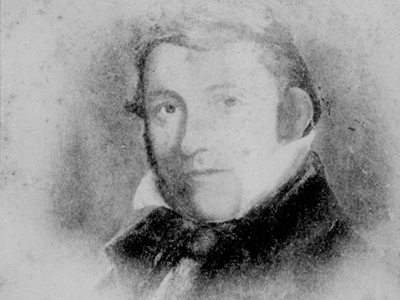
Descendant of Davy Crockett Finds Family Photo on UNT's Portal to Texas History
The Portal to Texas History’s photo of Davy Crockett was recognized by his great-great-great granddaughter, leading to an exciting discovery of a piece of Texas history. He is one of the most famous names in American history, Davy Crockett. Now a new piece of Crockett history has been uncovered on the University of North Texas website, The Portal to Texas History. The “photograph of a man’s face” has been on the portal since 2008. However, the identity of the subject in the photo was a mystery until Crockett’s great-great-great-granddaughter, Carol Campbell, recently reached out to the University Of North Texas. She found the picture online and wanted to reveal that the man in the photo was her famous relative. To read the full article, check out Descendant of Davy Crockett finds family photo on UNT’s Portal to Texas History by Tanya O’Neil. in_the_news
Posted:
01/13/2017
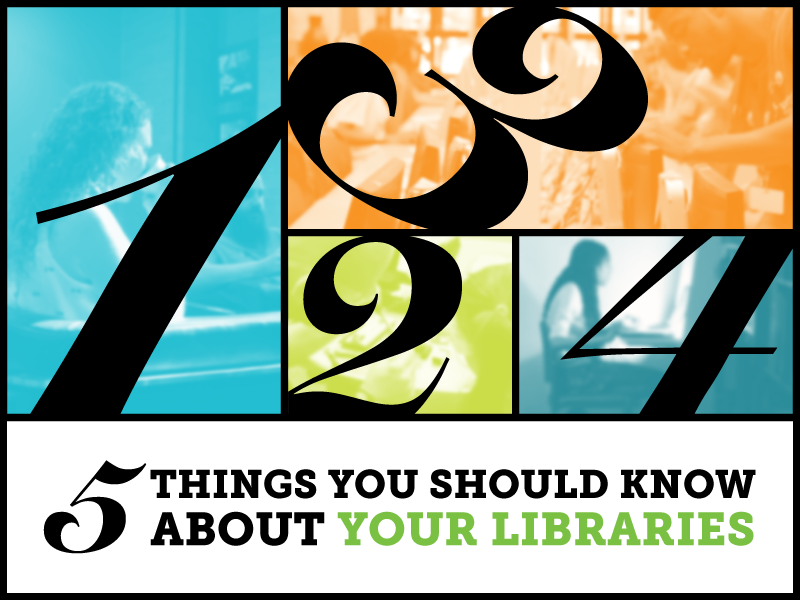
Five Things You Should Know About University Libraries
Welcome to 2017 and an exciting new semester at UNT Libraries! 24/7 Access Willis Library is open 24 hours a day, 7 days a week during long semesters! Check out our Locations and Hours page for hours at the Media Library, Eagle Commons Library, and Discovery Park Library. Laptop Checkout We have laptops for checkout at Willis Library, Discovery Park Library, and Eagle Commons Library. Check out our other technology and computer related resources available to you. Study Spaces The Libraries provide several study spaces and group collaboration rooms for endless learning possibilities. Reserve a group study room today. The Factory The Factory is Willis Library’s maker space that promotes the cooperative and creative use of technology. Subject Librarians Subject Librarians work in partnership with UNT departments, schools, and colleges to increase your knowledge of and access to library resources. Questions? Ask Us! in_the_news_did_you_know
Posted:
01/11/2017
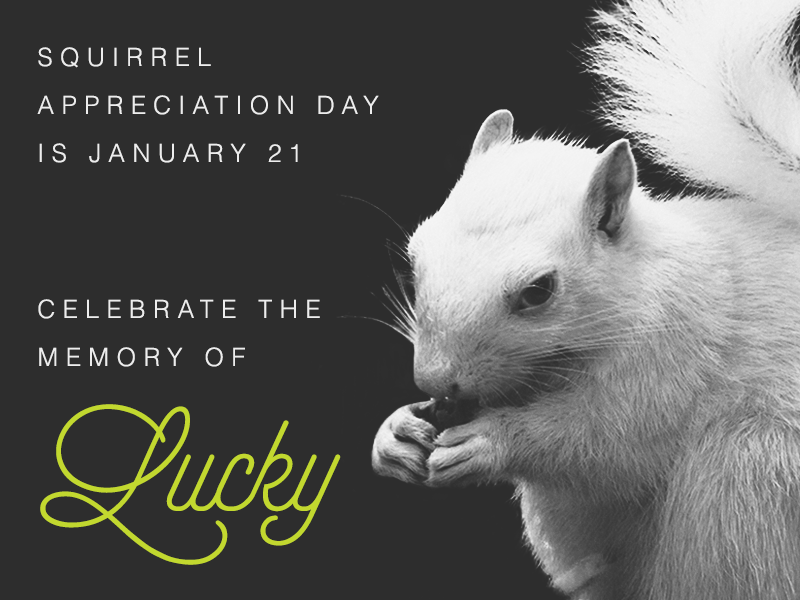
Squirrel Appreciation Day
It’s the start of a new year and a new semester - don’t forget to appreciate the squirrels! With the dawn of a new semester and a new year, there was one important furry friend that didn’t make it out of 2016. Lucky the Albino Squirrel, an icon on the UNT campus, met his untimely end just after finals, the victim of a car on Highland Street. On January 21, also known as Squirrel Appreciation Day, please take a moment to remember Lucky and appreciate the good luck and school spirit he brought to the campus. The albino squirrel has been a presence at UNT for decades, and legend has it that if you spot an albino squirrel on exam day, you are sure to get an A. Lucky’s life and impact on the North Texas community has been covered by CBS, NBC DFW, Dallas Morning News and UNT’s own student-run newspaper The North Texas Daily. Old issues of the Daily, including articles about Lucky, can be found on The Portal to Texas History. Although Lucky is no longer around to bring his luck, many of his relatives and descendants still populate the trees of North Texas. Keep an eye out for them! in_the_news
Posted:
01/04/2017